After leaving Gainesville, I head west along the Gulf of Mexico’s shoreline. Since the roads I choose are far from the main highways, cycling becomes quite enjoyable.
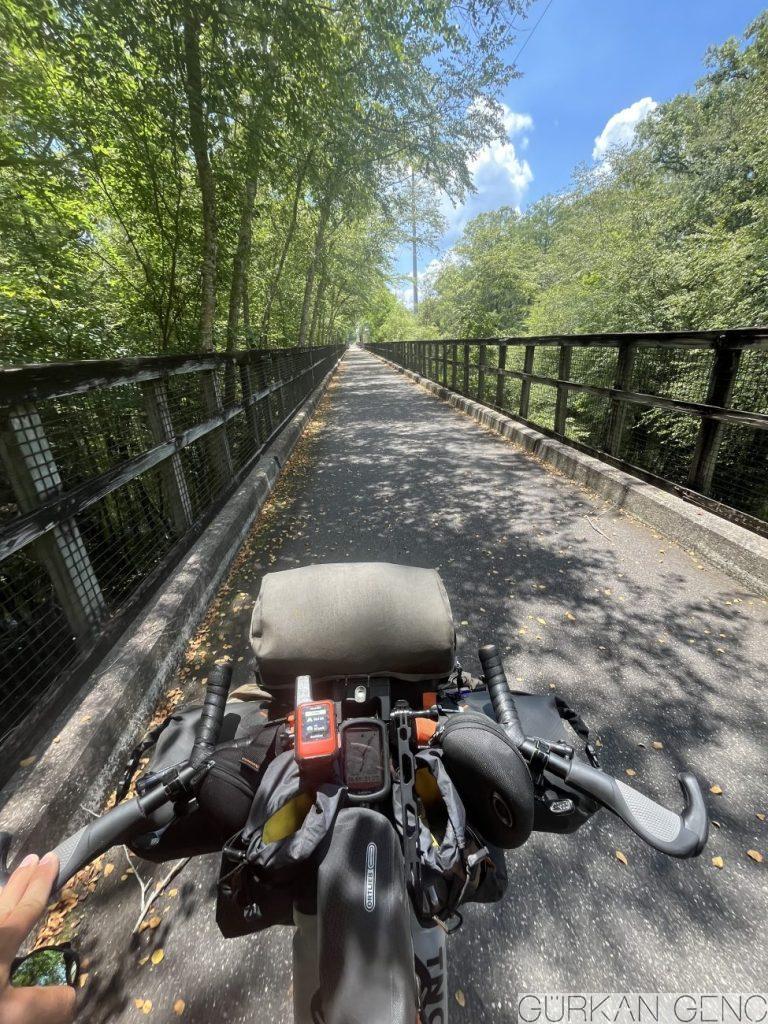
In one of the villages, I saw flags along the roadside. I parked my bike and began reading the names written on the crosses under each flag. They had decorated the entire roadside from the entrance to the exit of the village with these flags. From then on, I started noticing similar scenes frequently in the southern states. It’s something I’ve only observed in the southern states so far.
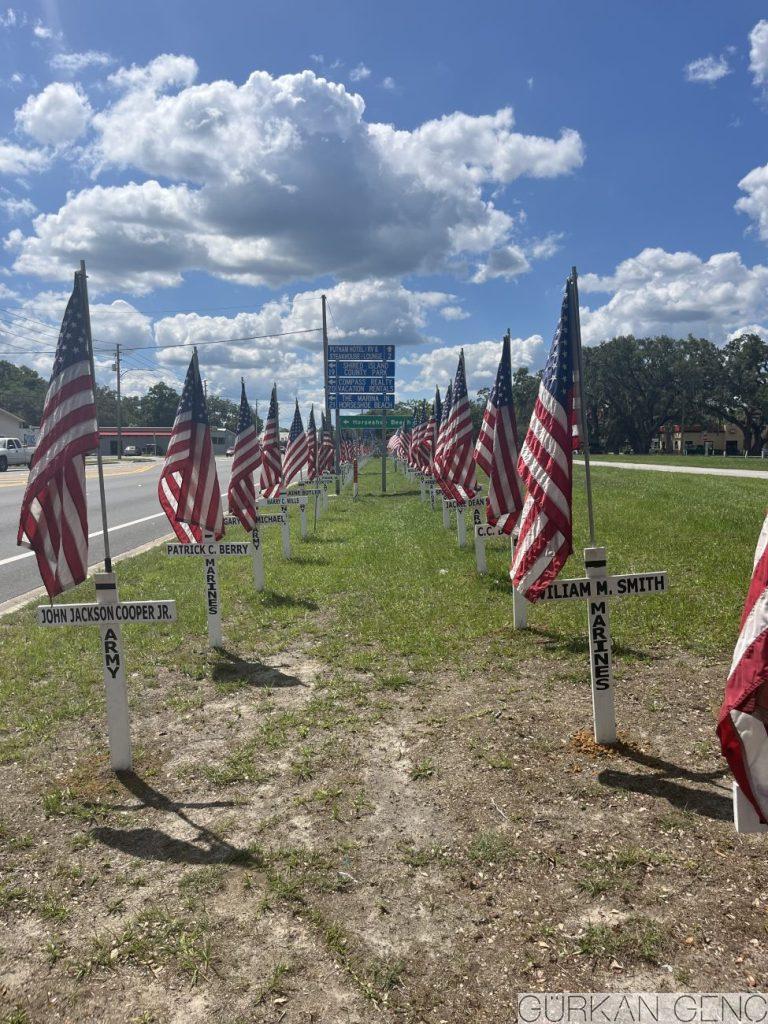
The people in the region immortalize their fallen soldiers in military operations outside the United States in this way. In our country, we honor our fallen soldiers by naming schools, bridges, and parks after them.
On the other hand, I also saw a similar situation on many utility poles along the coastline. The government sends a message to its citizens: “Yes, you come here to swim in the sea, but never forget that it is thanks to our soldiers who heroically defend the country against threats.”
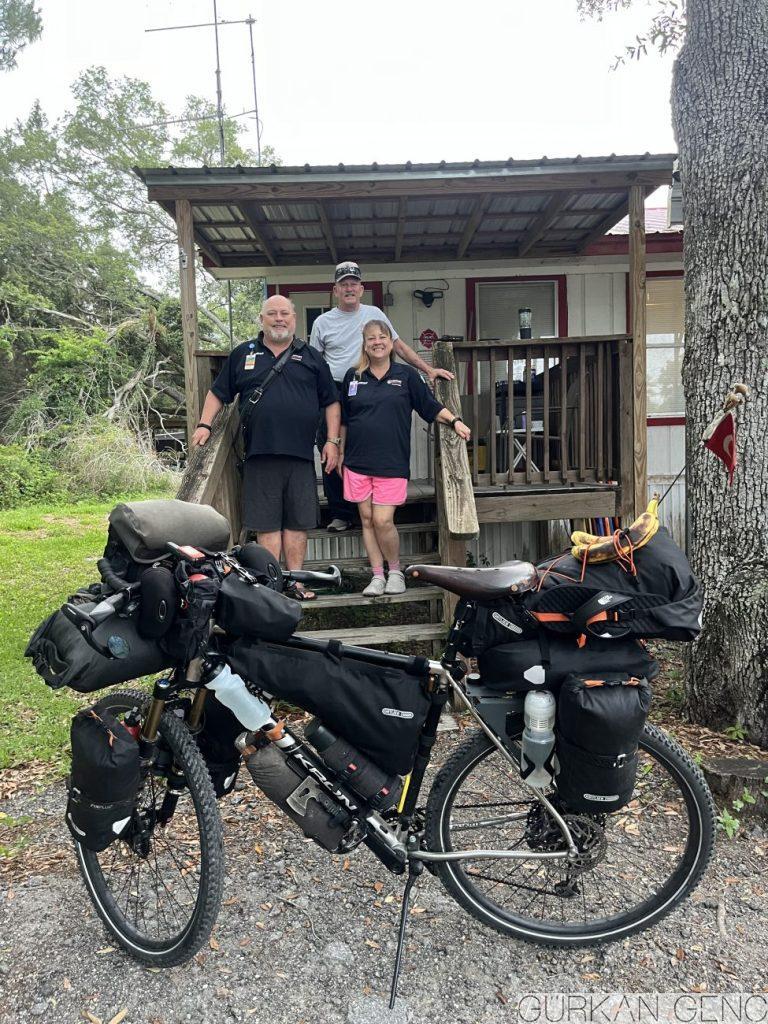
One day, a family who invited me into their home asked at one point in the conversation, “Can you tell us what’s happening in Syria?” I was quite surprised by this question. Why did they ask me about Syria?
- Why are you interested in Syria?
- Our children are there, serving in the military.
At this point, my thoughts no longer matter. I’m facing a family who has sent their child to the military, and their child is in a war zone. I had to be very careful with every word that came out of my mouth. I know well the longing look in the eyes of a mother for her child. I think I managed to have a conversation without upsetting the family.
During a speech I gave in front of a large crowd one day, after answering some diplomatic questions, our ambassador came to me and said a few words that made me quite proud. I think, thanks to the diplomats from our Ministry of Foreign Affairs, I’ve learned over time how to handle such sensitive discussions. Greetings to all the diplomats I know.

I didn’t know that Tallahassee was the capital of Florida until I came here. To be honest, I don’t know the capitals of most of the states in the US. However, during my travels, I’m learning them one by one in the states I visit. Tallahassee wasn’t on my route, but there was one reason I ended up here, my bike’s spoke problems. I kept breaking spokes. And not just spokes, I had another issue with the luggage rack for my KRON GG1, which I had adapted to my current G1/KRON model in a makeshift way.
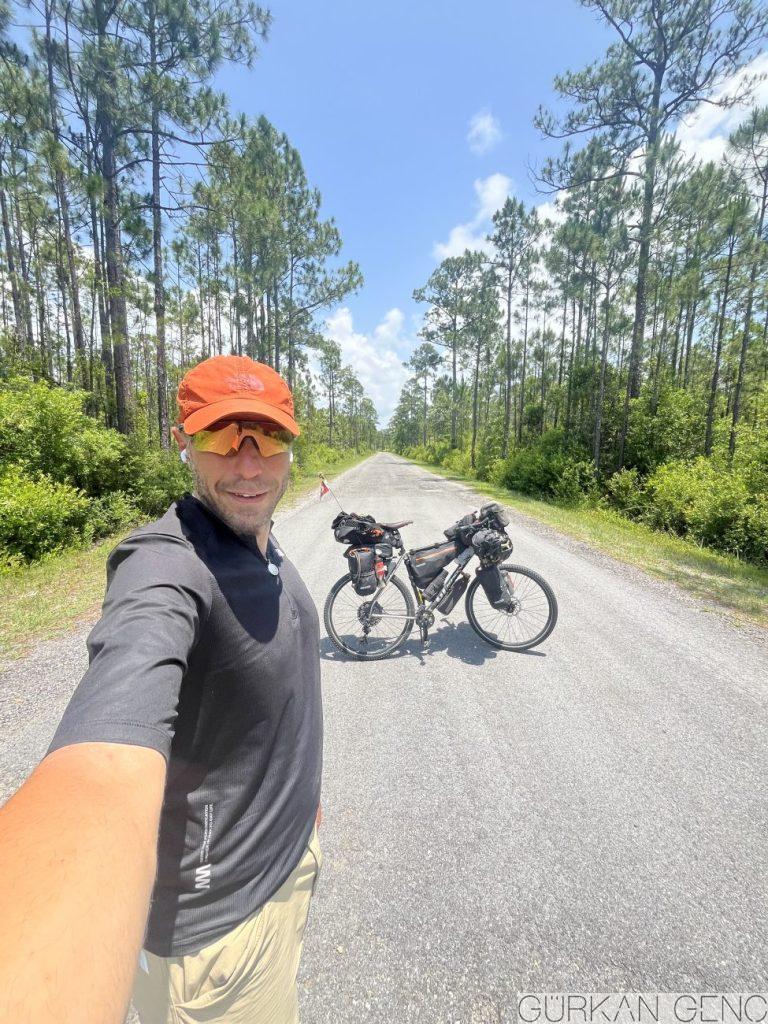
You know this bike; design is entirely mine, but I had the welding done in Colombia. The details are on my equipment page. When the spoke broke, the luggage, which wasn’t made for this bike, would rub against a part of the frame, causing wear on the rear wheel. So it was a big problem. A new luggage rack design is essential, but when and where I’ll make it, I’m not sure yet.
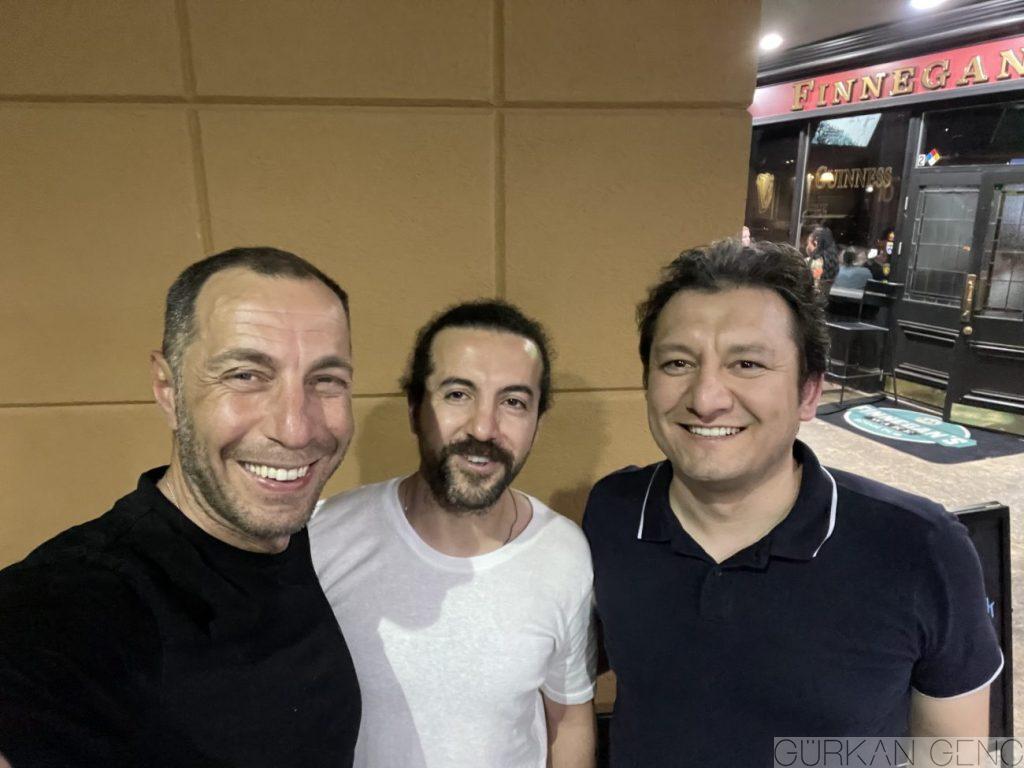
In the capital, I quickly tried to fix these issues with parts I bought from the local bike shop. While I was in Florida’s capital, I had the chance to meet one of my followers, who had been following me for years, along with their manager, for a coffee. It was truly a big coincidence that we met here instead of Ankara.
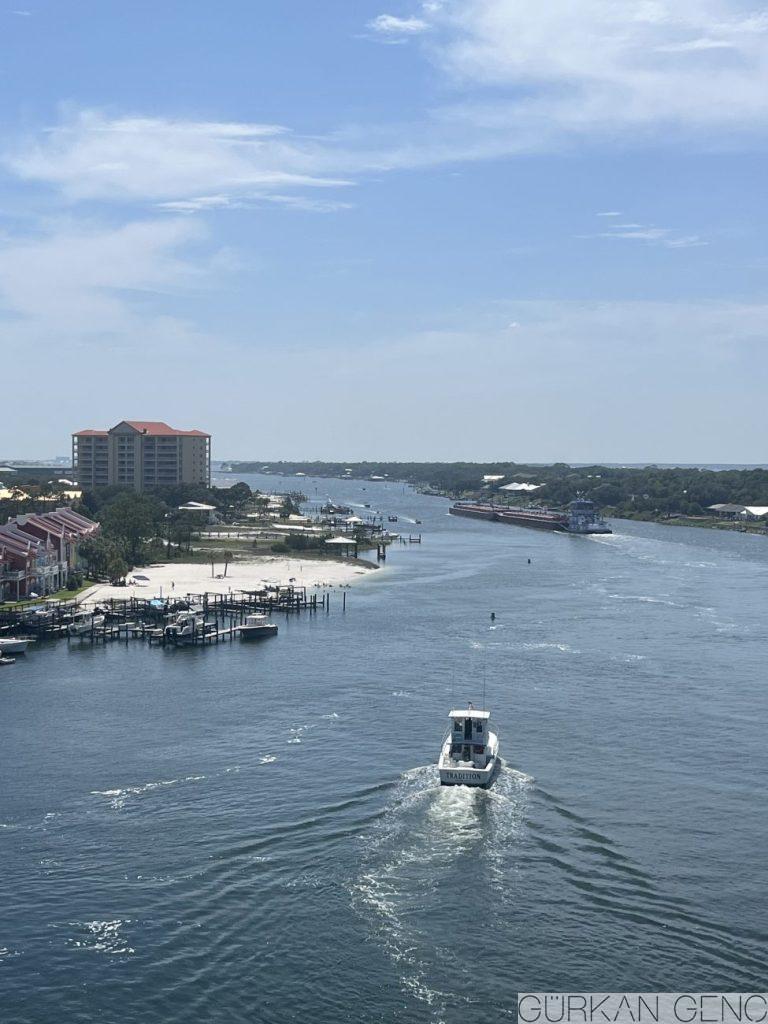
When I stay in large cities, the lowest rate I pay, including taxes, is $80, and sometimes I stay for more than a day. Although these accommodations put a strain on my budget, they are sometimes unavoidable. By the way, when I say “including taxes,” it’s because taxes vary from state to state in the US, so everyone quotes the price before tax. When making the payment, I can see the percentage of tax in the state. This is one of the details I don’t particularly like.
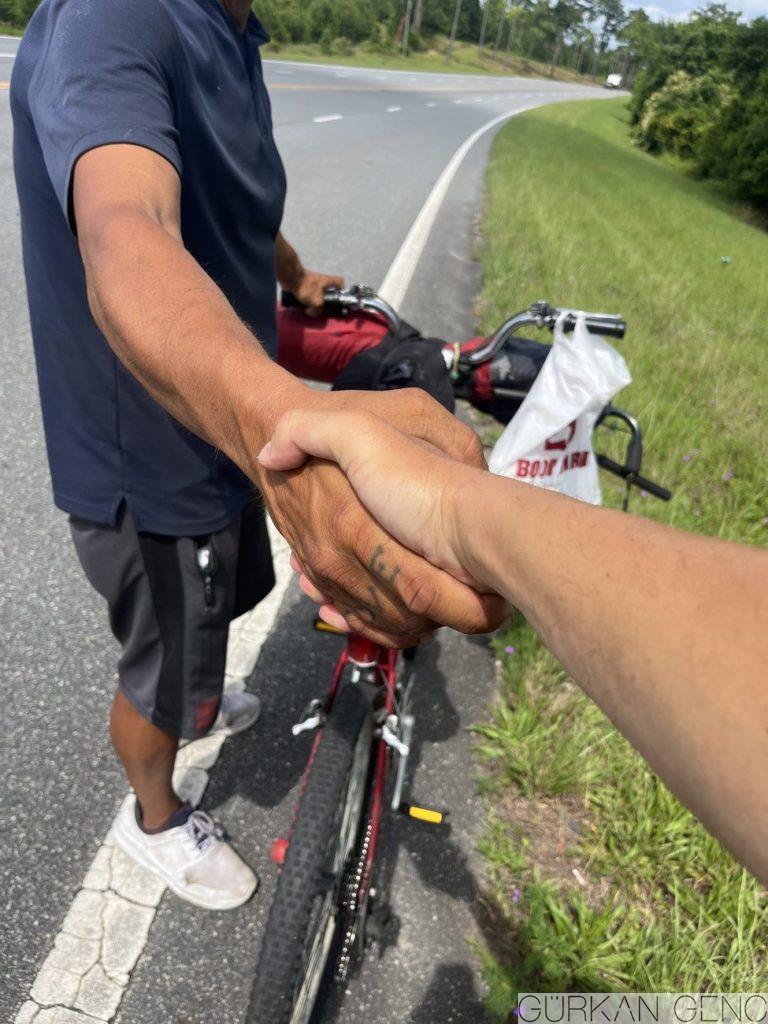
There’s a topic I often mention in my live broadcasts on Instagram. When I travel in the US, in the format of touring cycling, I’m often mistaken for a beggar. They soften it a bit and call me homeless. It’s very common to see homeless people or beggars riding bikes in the cities of the country. However, I’ve rarely seen these people traveling between cities on their bikes. The bikes they have are only equipped to get them around the city they’re in, not for traveling to another city and carrying their belongings.
As I head west, the distances between cities started to grow. Not only between cities but also between towns and villages. This made it a bit harder to access food and water. I either needed to carry more food and water or cover the distances faster. Up until today, during my trip across the US, I’ve only seen two homeless people attempting to cover these distances on bikes. Both of them had run out of water. I gave them some of mine to help them reach the towns ahead. Both of them sincerely thanked me, saying, “Buddy, I really appreciate it.”
I told one of them, I’d like to immortalize this moment, and I took this photo.
Believe me, none of the vehicles on the road would stop to give water to these people! But for me, it didn’t matter at all. I could easily go 50 km without water in that area. I had tested this when the terrain was flat. Also, when I want to, I’m quite fast compared to a typical touring cyclist. That’s why I don’t carry extra water and food in the US. However, as the winter months approach, I’ll definitely make some adjustments to my bike setup.

But there’s another side to this. I’m sure you’ve seen videos or photos online showing how Americans help people on unusual journeys like this. I’m talking about those who walk, run, or bike across the continent.
If the person undertaking the action has been featured multiple times on national or local TV news, and it’s clear they’re not a homeless person or beggar but are doing this for a purpose, they receive incredible hospitality from Americans. However, if they haven’t seen anything about it on TV or social media, they won’t approach you. They might even change their direction if you cross their path. Setting up a tent outside designated campgrounds is also very difficult. I’ve been experiencing this social situation for months.
One of my followers asked, “You’ve been on the road for 14 years, aren’t you burned out?”
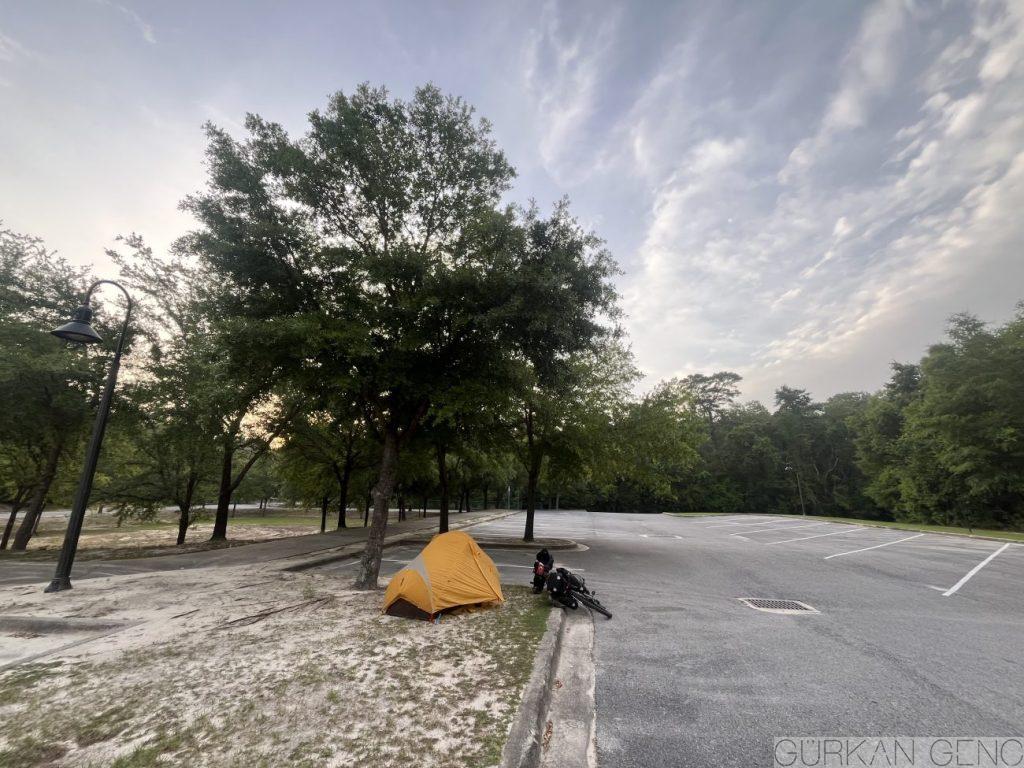
Burned out. After writing that word, I looked up and faced the woman in front of me. I was writing my memories in a coffee shop. A very beautiful woman in her 40s was sitting across from me. The sunlight coming through the window hit her eyes, bringing out the color of her eyes. Her hair fell over her shoulders, partially covering her face, adding a magnificent touch of mystery. As she spoke to her friend, her facial expressions, the way she moved her hands, and her smile blended perfectly with the beauty of the story being told. Yes, she was a beautiful woman. If I hadn’t seen the ring on her ring finger, I would’ve gone ahead and said how beautiful she was. Wait, I should say it anyway. (I said it, and she smiled and thanked me.)
Now, was it a huge stroke of luck to be sitting here and meeting this woman? No, it wasn’t. This isn’t luck. If we rewind, I chose to go on this bike tour myself; no one forced me. No one said, “Here’s money, go travel.” Contrary to what many new followers might think, “Oh, sponsors gave him money, and he’s just traveling,” that was never the case. I set off on this journey because I wanted to explore and see the world, for myself. No one EVER has to go on such a journey to prove something to anyone. I’ve never been someone who wanted to run away from their country. I always say I want to be the Minister of Sports in my country. (That’s a dream, and much harder than a world tour.) As long as you stand by me and allow me to apply what I’ve learned in the best way possible back in my country! Many people follow me who don’t understand what I’m saying, and I still don’t get why they’re following me. J
I’ve experienced burnout countless times on the road, and I continue to do so(!). However, during this process, I never put my life in danger. I never entered a path blindly and recklessly! I took each step by calculating the possibilities, weighing the pros and cons, and planning carefully.
Yes, I crossed deserts, but each time I calculated and made sure to carry enough water and food. In winter, I saw -57°C on my bike and slept in my tent at -45°C at the polar circle. I’ve also seen temperatures reach 61°C in the hottest periods of the desert.
But for these climates, I had the proper equipment and enough food and water on my bike. It truly requires very, very precise calculations; otherwise, nature would have killed me in those desolate places. You can’t explain this, and even if you try, the person in front of you will likely look at you blankly and without comprehension. I know that as I recount my experiences, I can never fully explain what I felt at the moment, where I’ve been, and how it felt.
Yes, I’ve gone to very desolate places and peaks all alone. But thanks to the tracking device on my bike, everyone always knew where I was. There was always a button to ask for help. Granted, by the time I pressed that button, it would likely have been too late for everything, but I still never engaged in anything that would put my life at unnecessary risk.
As I was writing this, I smiled. The person writing these words didn’t have travel health insurance between 2015-2024. There was no retirement; the pension law (Called EYT in Turkiye) passed, and now I’m retired in my country. (The scale of the risk I took is incomprehensible, but as I said above, no one will understand, and I won’t try to make them.)
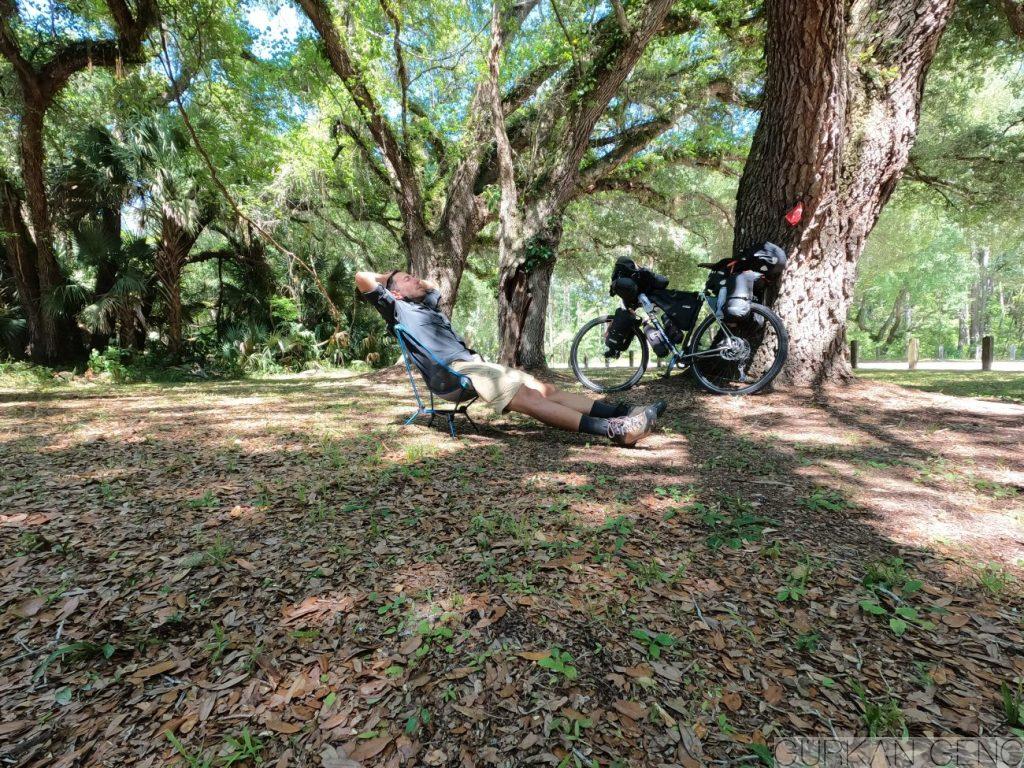
God has given me a certain amount of time on this planet. I’m trying my best to make the most of it. When I’m burned out, somehow, someone unexpectedly helps, and when I fall, someone sends a message asking, “Are you okay?” That’s why I share my posts. For myself, because with these messages or support, whenever I burn out or fall, I always stand back up strong. You know how in major races, when a tired runner is about to cross the finish line, other runners grab their arm to help them along? Well, that’s you. I thank you, the ones who’ve supported me, for not making me experience the burnout many people face in their lives, during this challenging journey. YOU ARE ALL GREAT.
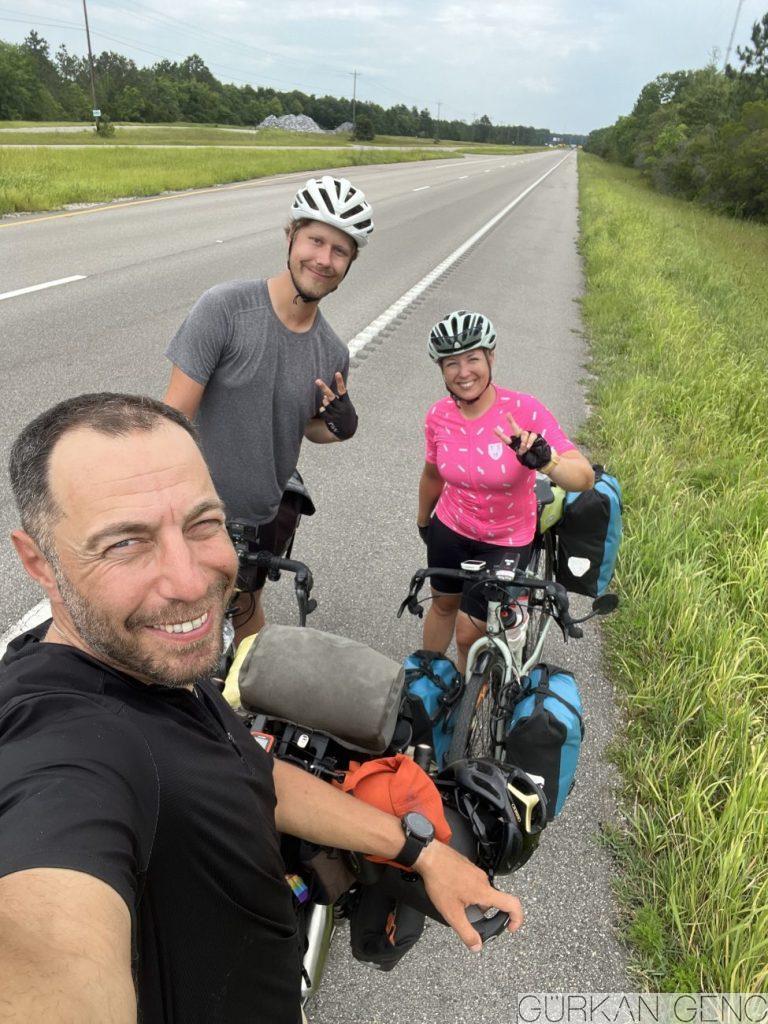
I’ve pedaled on the bike path for so many days across the United States, and yet I haven’t seen a touring cyclist traveling the way I do. But as I was heading west, I met a couple from Finland and a young guy from Germany. They had started from the west and were heading east, mostly using the WarmShowers app to stay in people’s homes. During our brief conversations, we found common ground in the United States and its culture. It was as we expected, but some things truly surprised us.
There are certain situations in this country that both scare and surprise me.
I’m writing this article in November 2024. In the past three years, 9 million immigrants have arrived in the country, 2.5 million of whom entered legally, and 7.5 million entered illegally through the Mexico border. Today, more than 200,000 people cross the border illegally each month. Research shows that more than 70% of those who have entered illegally in the past three years don’t even have a high school diploma. In 2023, the United States became the fastest-growing and youngest country globally in terms of population.
At this point, many analysts make the following comment:
“The United States manages its immigration policy very well and assimilates these differences into the system.”
This is the most ignorant, foolish, and absurd sentence I’ve ever heard. These advisers think they know something, so they hire people like this. These people don’t know anything themselves and are seeking help from someone else, who has buried their heads in books, attended a few schools, written articles, and acquired a few titles, but this is the kind of sentence they come up with.
Theoretically, you don’t know the land area of this country, the land size of each state, the population living in those areas, or the resources that vary by region. On top of that, you’re unaware of the raw materials this country imports from outside its borders. In my opinion, even a primary school student would never make such statements after researching and learning these facts, yet here you are providing consultancy.
Back in Turkiye, a friend started explaining the Middle East to me. I listened for about 15 minutes. Then they asked me a question, and I asked them this:
– “Have you ever been to any country in the Middle East?”
– “No, I haven’t.”
– You’ve shared your perspective with someone who’s spent an entire year meticulously exploring the region, meeting with officials from Turkiye and many Middle Eastern countries. Meanwhile, being a hurler on the ditch; reading articles or watching what others want to show, now expects confirmation from me about the things they’re sharing. You realize that, right? It doesn’t work that way, my young friend. Things can’t be understood or explained from the perspective of just reading articles. He laughed when I said that. There were a few more things I could’ve said, but I thought better of it. Sometimes, I ask myself, “Why do I even bother sharing this with people around me?” It’s funny in situations like this. Honestly, I couldn’t care less how others think! I’m sorry, but I’d like to tell you straight that you have no idea about what’s really going on. If I say that, though, it somehow turns into “You think you know everything.” The truth is, I don’t think I can tolerate people blindly commenting on the world anymore.
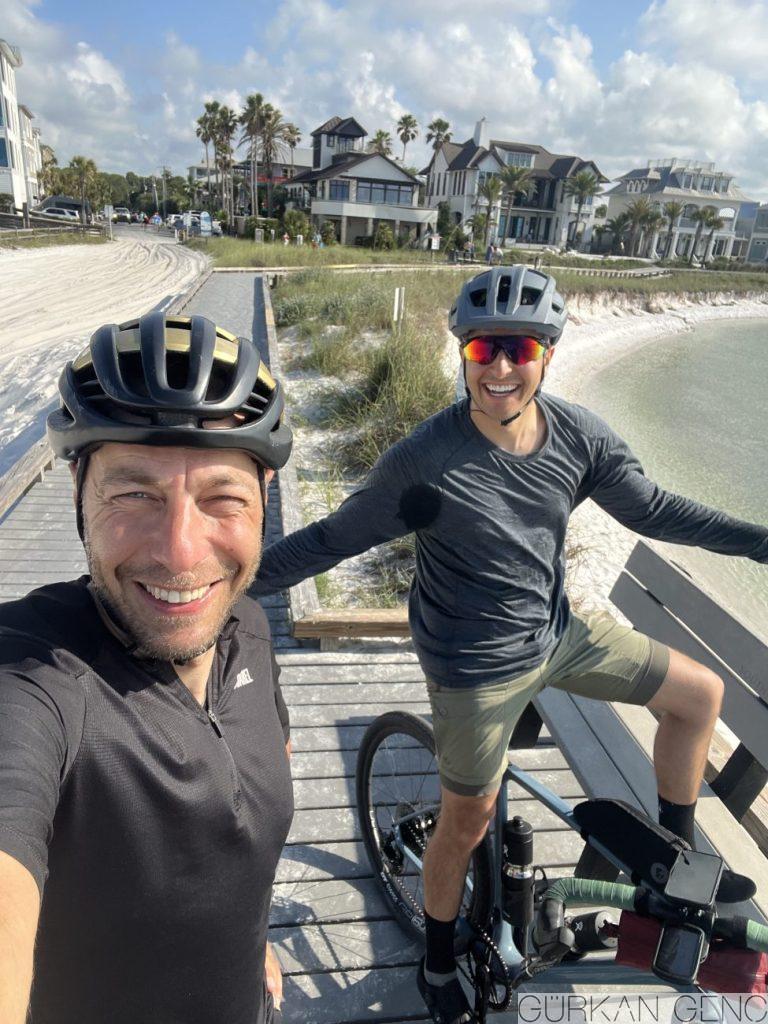
I found someone on WarmShowers in the next town, Tyler, and I messaged him to let him know I was heading toward his place. I don’t know if he’ll invite me or not, but we’ll see. If not, I’ll just pitch my tent and move on to the next town.
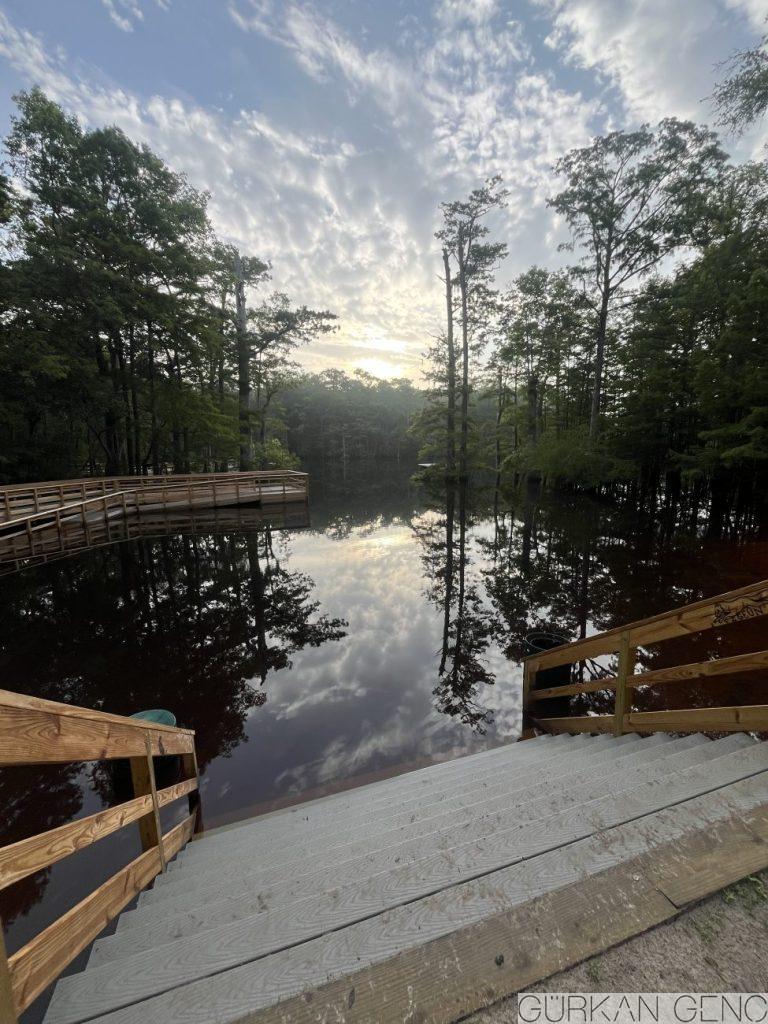
Before that, there are a few hot springs I want to visit. The roads I’ve been traveling are truly beautiful, though quite flat. After a while, not being able to see anything because of trees can get a bit boring. Also, in Florida during the summer, camping with the constant sound of crickets isn’t exactly easy to sleep through. Especially in places like hot springs, the bug population is unbelievable. I’m grateful there’s no malaria in this region. Mosquitoes bite everywhere, day and night, leaving no part of my body unbitten. The hot springs are connected to small streams, so when swimming, you need to be cautious of alligators. You might remember from my previous post the incident with Yasemin and her family when we went kayaking.
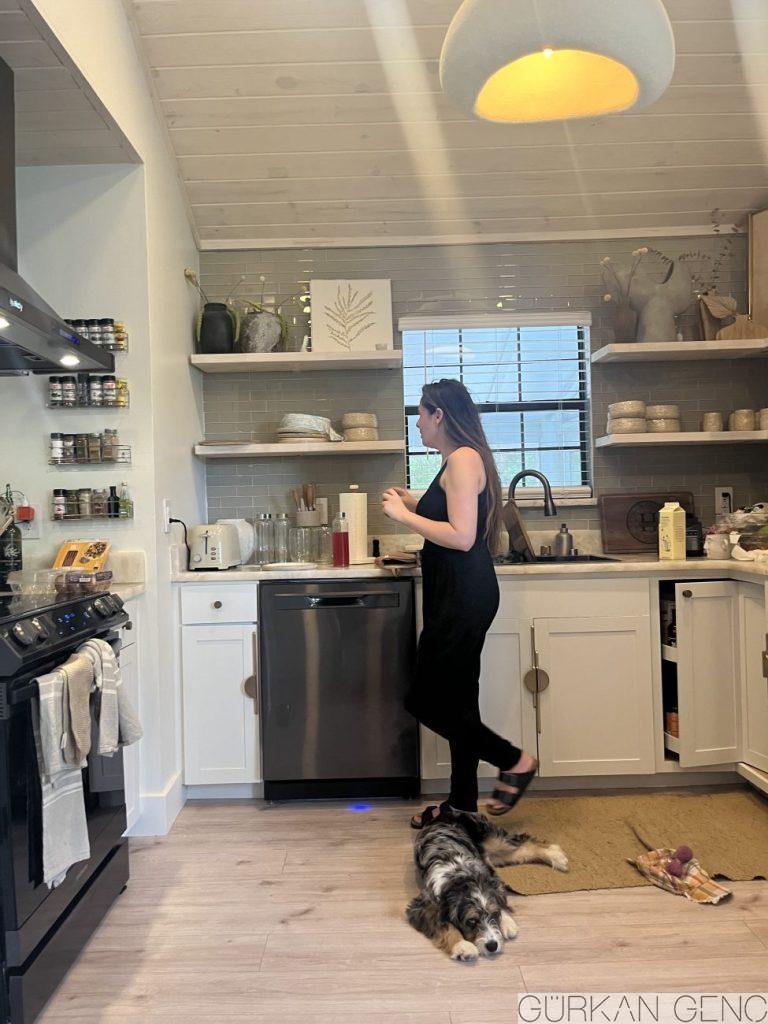
Tyler and Cristina have been inviting touring cyclists passing through Florida to stay at their homes for years. They’ve also been in the Airbnb business for a long time. They rent out homes to small and large families, or solo travelers, who want to stay in the Destin area of Florida. They have a couple of houses and some they rent out, depending on availability. When I arrived, all the rooms at the house they invited me to were occupied, so I set up my tent in their garage. Cristina’s cousins had come to surprise them, and Cristina was quite upset about the situation.
– “Hey, Gürkan, I’m really sorry that you’re staying in the garage. I feel bad about it.”
– I reassured her: “Cristina, there’s no need to be upset. I’ve got a shower, breakfast, dinner, and a safe place to stay. What more could a touring cyclist want? Right, Tyler?”
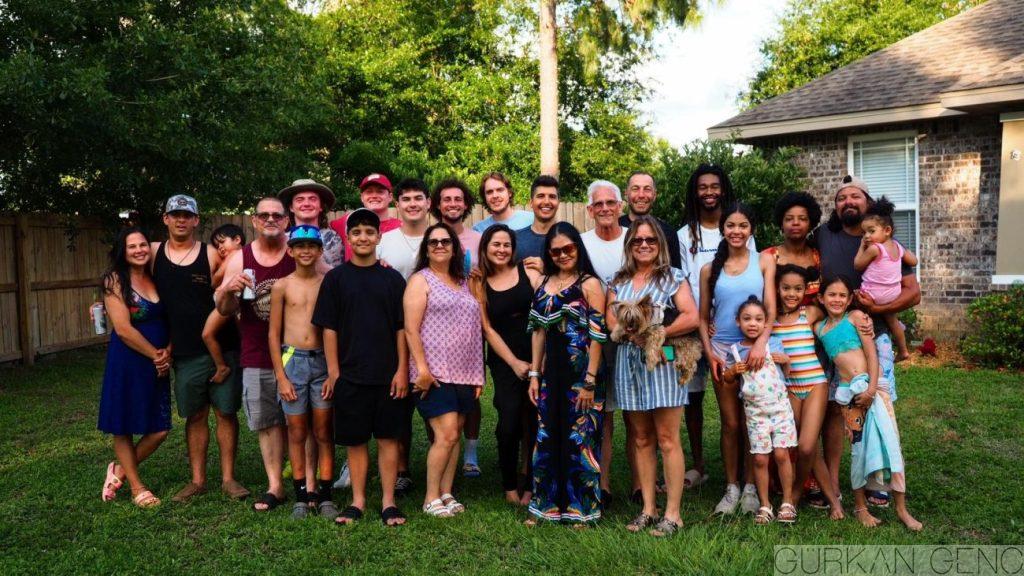
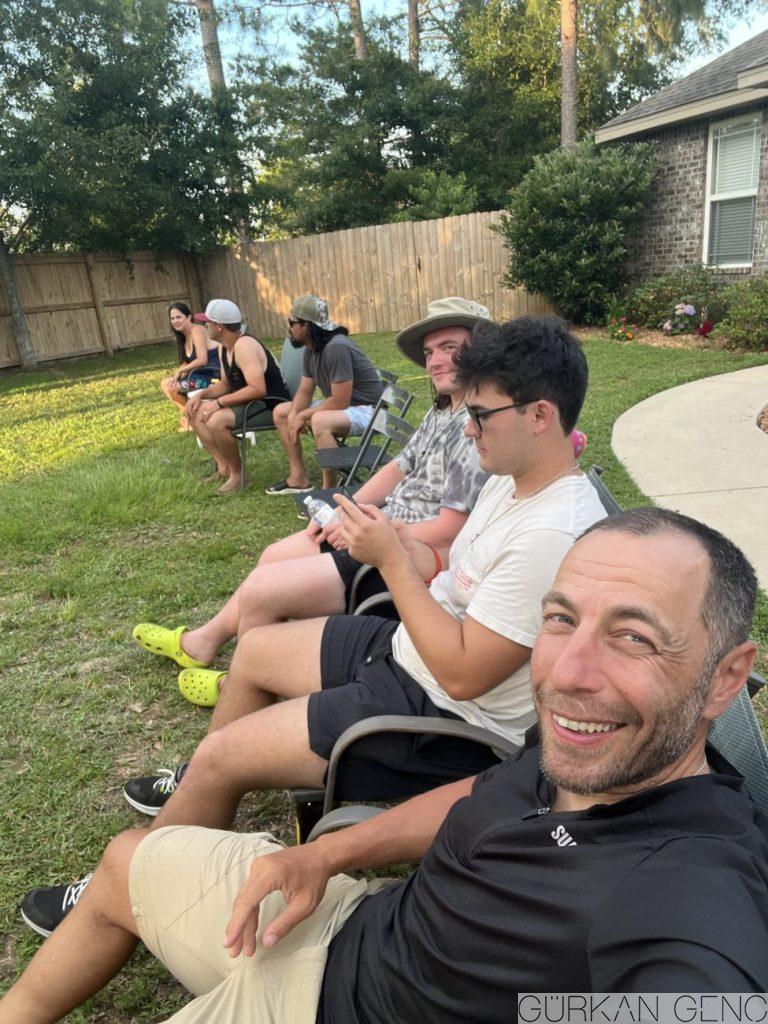
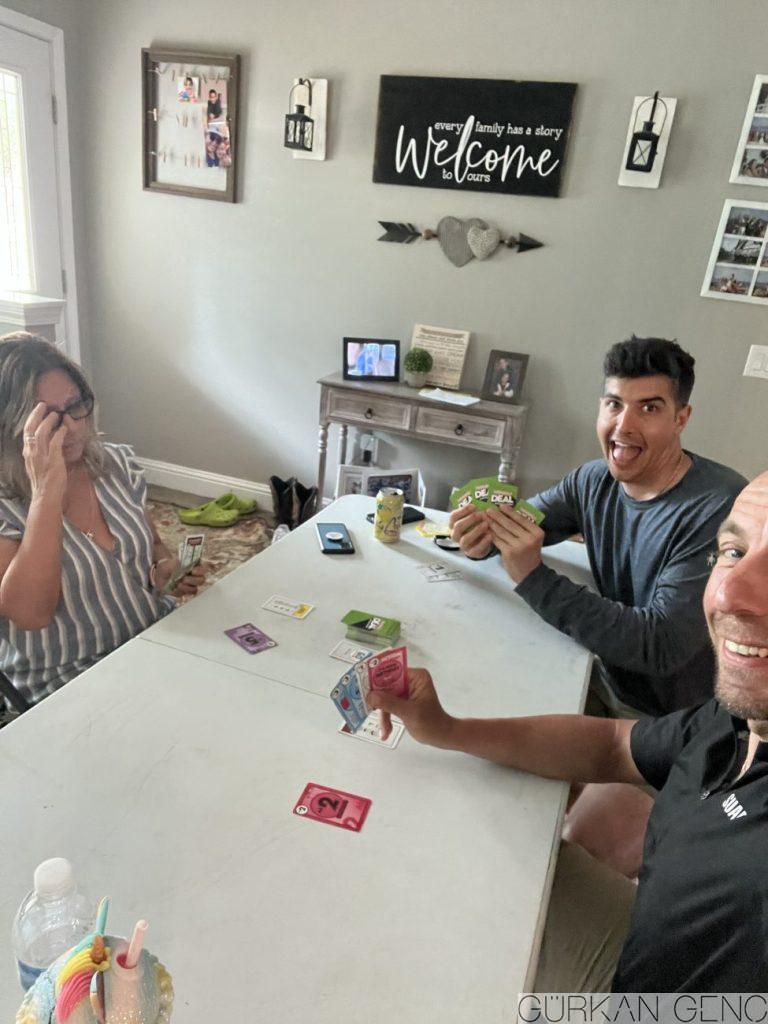
They took good care of me. The next day, just as I was about to leave, they insisted I join the family for dinner, and I ended up spending time with their wonderful, large family. It was lovely. We even played a game called “Cornhole” with all the men in the family. You should look it up online. Tyler and I teamed up, and money was put in the middle. Result: There were some Cornhole champions in the family, but we didn’t show any mercy. We won and took the prize money, hahaha.
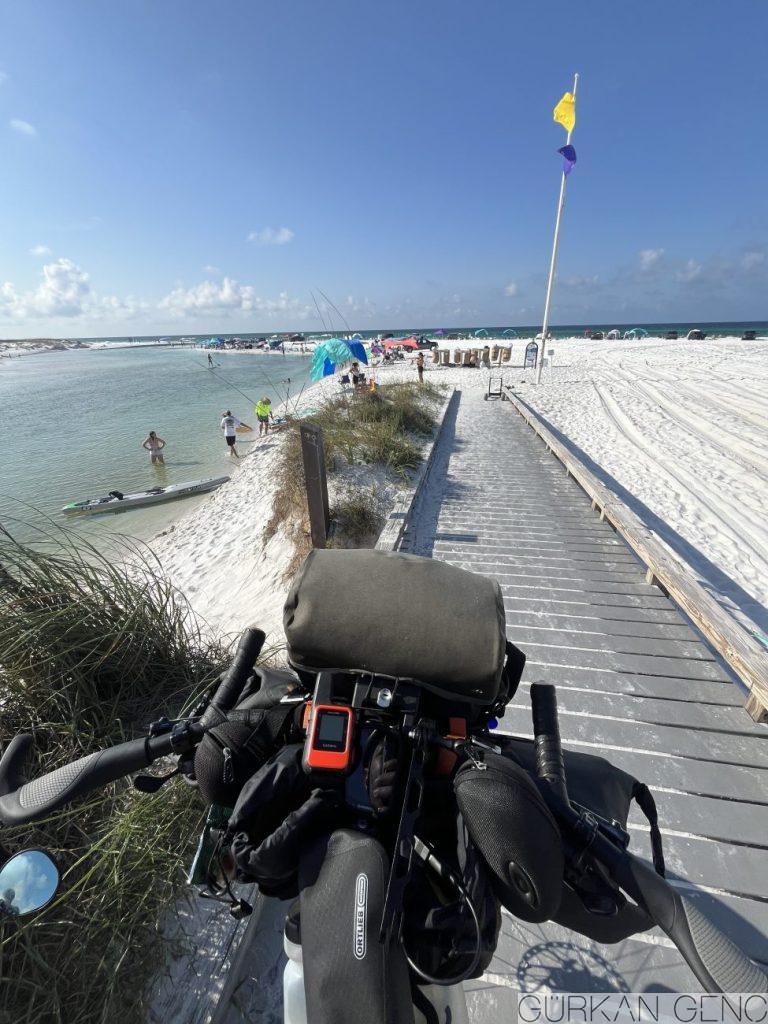
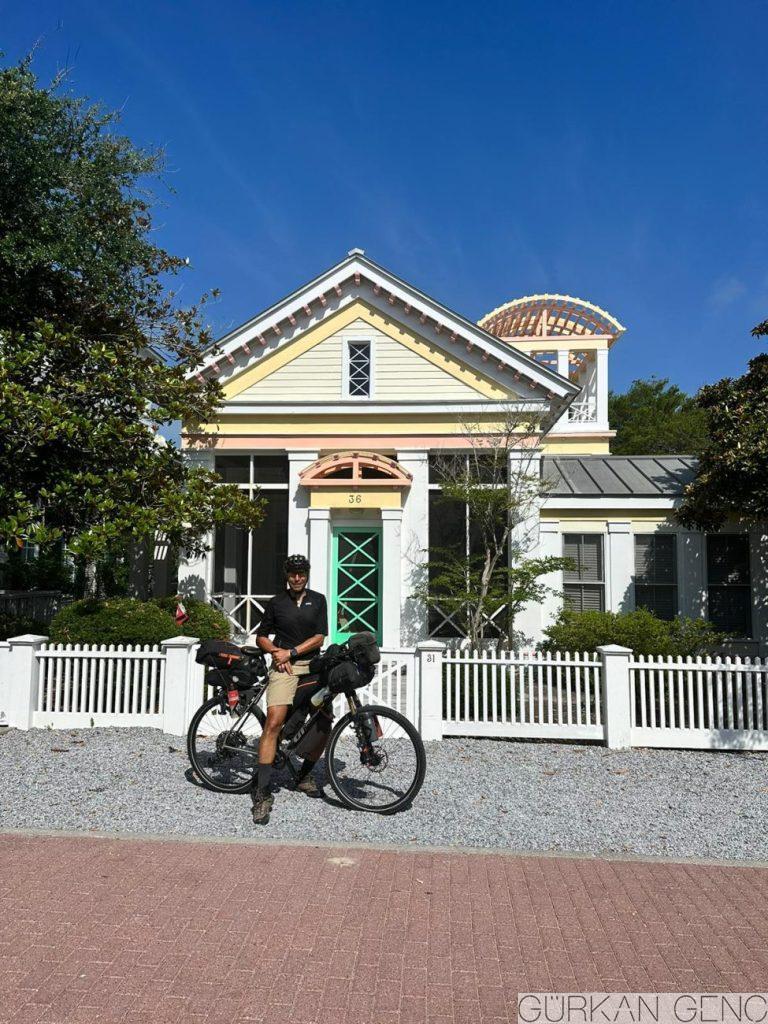
The next day, Tyler and I did a short bike tour around the area. We even visited a location featured in one of our generation’s iconic films, The Truman Show. The movie is a great reflection of many things happening in the world today. I think I’m one of those people who walks through the door and leaves everything behind. Note: On the other side of the door, things don’t seem all that different.
If you have a house in Destin, it’s nice, but if not, I’d suggest staying somewhere nearby for the beach and the experience. The center of Destin itself is incredibly crowded.
Tyler was amazed by my bike. He had spent $7,000 on a Koga model for himself, with a closed gear system and a belt drive. Whenever our bikes were parked next to each other, his eyes were always on mine.
“Hey, Gürkan, should we swap bikes?”
“Sure, go ahead.”
I have to say, I didn’t enjoy riding Tyler’s bike. Let’s see what he thinks about mine. For the first time, someone who really understands touring bikes is getting to ride mine.
– Gürkan, where can I buy this bike?
– You can’t buy it.
– Why not?
– Because it’s a custom-made bike.
– If I tell KRON, can they make me one too?
– Unfortunately, they can’t. Because the design is mine.
– That’s ridiculous. How can such a beautiful model not be available on the market? Then, can you make one for me?
– Maybe in 2025.
– I really can’t believe it… Okay, then where did you get the luggage rack for these bags?
– That’s also my design, made specifically for this bike.
– You’re joking, right? This rack is made for Ortlieb Fork Pack bags, and it looks great, and very durable. Isn’t it available on Amazon?
– No, it’s not. It took me 5 years to get this rack right. I broke a lot of racks, and this is the final version. Also, it’s made specifically for this frame.
– You can’t be serious.
– Yes, I am.
– That’s strange… Let me know when you start producing your bike and rack. I’d like to buy them.
– Of course, I will. The bike will probably cost over $6000.
– Given the parts and design, that makes perfect sense. I’d still want one of these bikes.
This bike’s angles are completely different from MTB, gravel, and touring bikes. What I envision for this bike is creating two different models under the GG brand. One will be an electric touring bike, with different frame sizes, initially nine models. The production will be in Ankara, at the Ostim Industrial Zone. The factory is ready. The bottle cages and racks designed specifically for this bike will be made alongside the frame. If KRON decides to make a similar version, they could launch a more affordable model with my signature based on my current bike. While we’re on this topic, people often ask about the coffee company. That company is still active. I’m still in touch with my friends who own coffee farms. As soon as I find investors for the project, it will come to life. When the time is right, it will happen. I’ll also need financial support for the bike project when the time comes, but that will work out too. In 2013, I said I’d write children’s books, and they were published in 2020. I’m not in a rush.
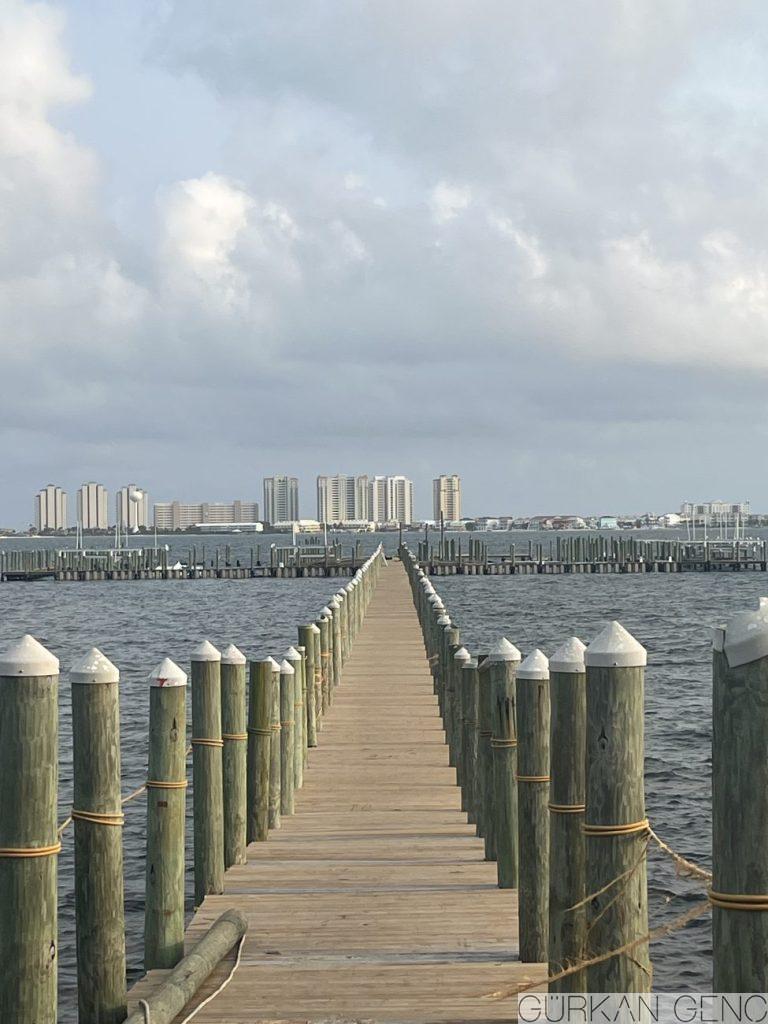
After leaving Destin, I highly recommend traveling through Santa Rosa Island. The island is beautiful, especially Opal Beach. Right after that, you’ll find Pensacola Beach. If you pay attention, you’ll notice that many American films frequently mention this place as a vacation destination. I liked it too. However, something did catch my attention…
Okay, the beach is nice, but the local government hasn’t provided a single toilet or even a bench to sit on. After swimming in the sea, there are no shower facilities either. When I asked Tyler why they don’t provide these, he told me, “They don’t want homeless people settling in the area, Gürkan.” But it hasn’t stopped the homeless! It’s quite common to see them along the beach at certain intervals. Additionally, some areas smelled of urine and feces. Honestly, I was shocked by how few local government workers I saw in the area.
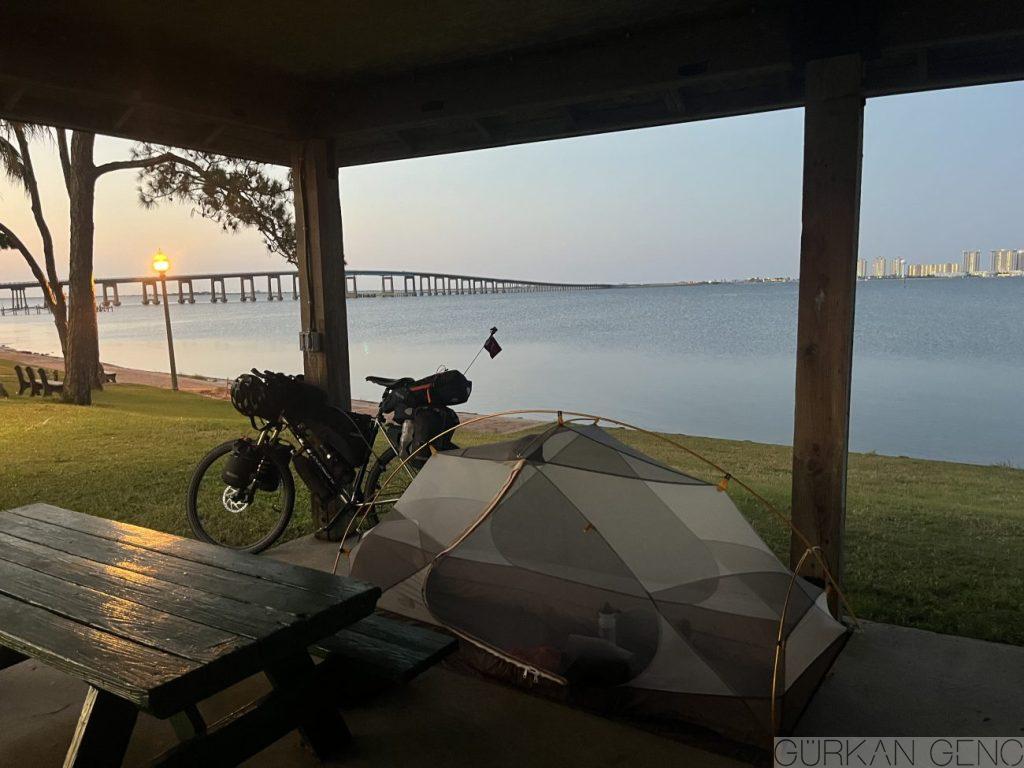
After this area, I came across Perdido Key. I set up my tent in a park before heading to Perdido Island. I went to the fire station first, but they wouldn’t allow me to set up my tent in their garden.
Ah, where is the beautiful Latin American hospitality? I’ve been on the road for miles, and not a single person has stopped to offer me water. I kept thinking, “Maybe an American will offer me water.” As I mentioned before, if I were a well-known athlete in the U.S., the situation would have been totally different. I see this through the hospitality shown to me by Americans who recognize me and invite me into their homes.
“Gürkan, aren’t you carrying any water?” No, I have enough with me. This is the 70th country I’ve biked through, and for the first time, I haven’t been offered water by anyone along the way. It’s a stark societal difference that I’ve been observing in disbelief for miles.
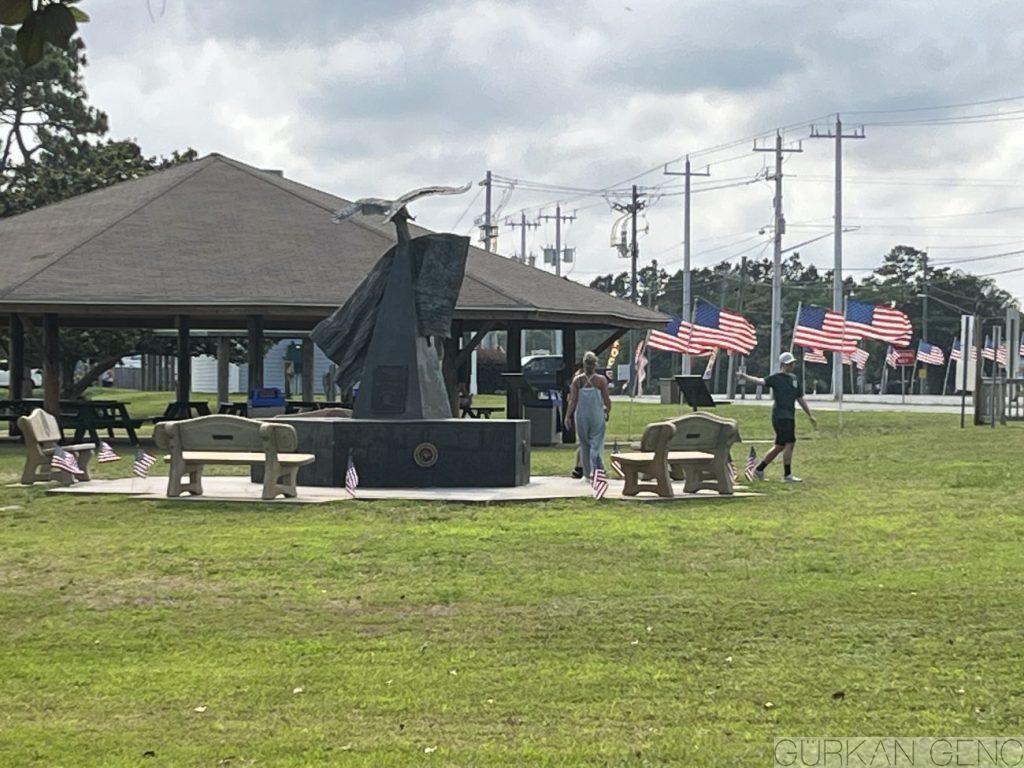
The park where I stayed is dedicated to the U.S. Air Force. It was July 4th, and I sat in the park’s center to observe the people walking by, preparing to set up my tent later. Right in the middle of the park, there’s a monument dedicated to the Air Force, and next to it, an American Eagle symbol stands. Periodically, families with young people, aged 15-20, would walk up to the monument and salute in front of the waving American flag. I can say that all these young people are patriotic American citizens. Their posture and the seriousness with which they salute, followed by placing their right hands over their hearts and standing still, made it clear that these young people were military candidates willing to do anything for their country.
There’s also a group of people who have migrated to this country for money, became citizens, and later enlisted in the military. You can find people from all the nations in that group. However, you wouldn’t see them saluting the flag alone in parks like these. They are focused on the money they receive.
In today’s world, we’re all indirectly involved in or supporting wars and exploitation. The person who claims they aren’t part of this is probably carrying either a Samsung phone or an iPhone in their pocket. From the Teflon pans in their kitchen to their thermos, to their waterproof jacket, everything they use has ties to military technology, and yet they are oblivious to it. When I explain how many things have come to be because of these uses, they often respond with the foolish remark: “Oh, you’re going too deep with this. If that’s the case, we should stop using anything.”
The human race is strange. People are good at acknowledging something, yet pretending not to see it. I’m not saying we should stop using these things. I’m saying to remember that we’re part of this destruction, and to wake up, but unfortunately, it seems to go in one ear and out the other.
What is clear after 14 years is this: Every state must protect the land and citizens within its legally defined borders. Because, as long as “there is a threat to humanity’s survival,” the human race will continue to fight against other states for their interests and will persist until they get what they want. I’m sorry, but unless something comes along that threatens the entire world’s population, this cycle will continue.
I wish there were no borders, no distinctions between religion, language, or race, and that resources were used equally. I wish everyone could receive the same education and healthcare, and be raised with the same tolerance all around the world. These were the desires and wishes of Gürkan Genç, who biked from Turkey to Japan in 2010. But now I know that for this to happen, a painful beginning and massive destruction are required, a destruction that will leave a lesson and never be forgotten, and it will affect all of humanity. Only then can we talk about unity. If humanity doesn’t learn, sadly, the destruction I’m referring to will be so great that it won’t even be able to be called the third world war after the first and second. We will give it a different name…
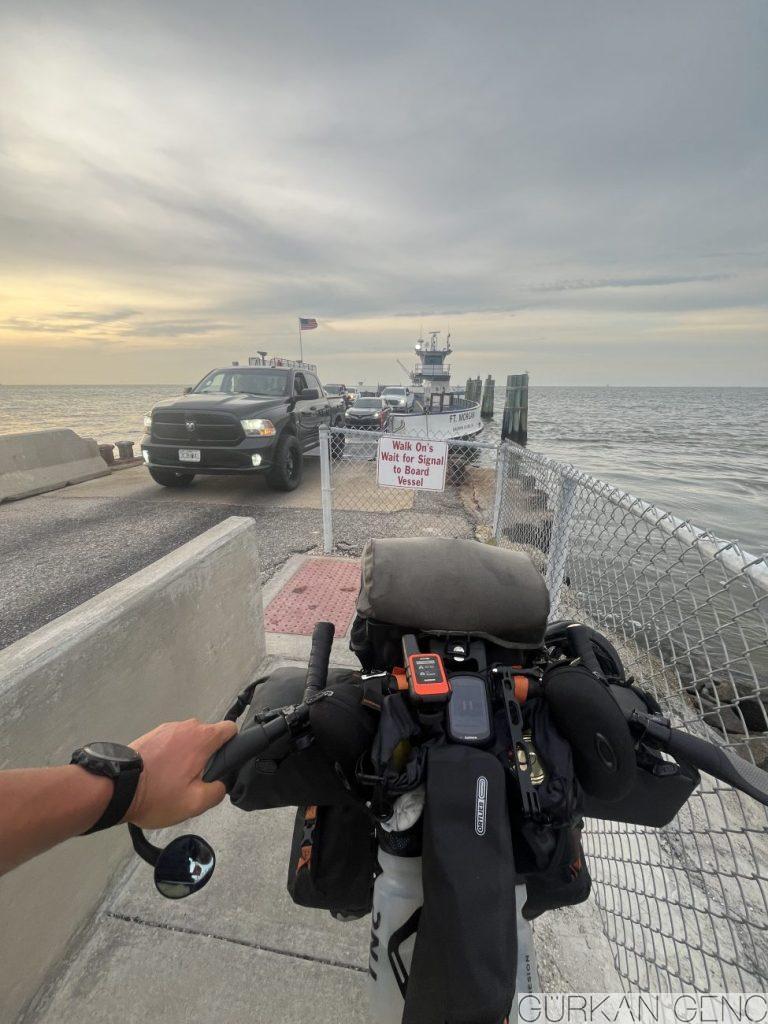
After leaving Perdido Island, I went to Orange Beach, and then to Fort Morgan, and took the ferry to Dauphin Island. I had enough of the coastline. There was a bike path all along the coast, and it was simply amazing, I loved it. However, one thing stuck with me. I couldn’t spend much time in Fort Morgan. There was a ferry that I had to take in the evening, because the next morning, Mehmet was coming from Texas to pick me up, and we would drive back to Dallas together. We were going to watch the Women’s Volleyball match of the League of Nations, and then he would drop me back at my spot. That’s about 995 miles, not a short distance. Even though I thought there was no need, Mehmet Oral did it anyway.
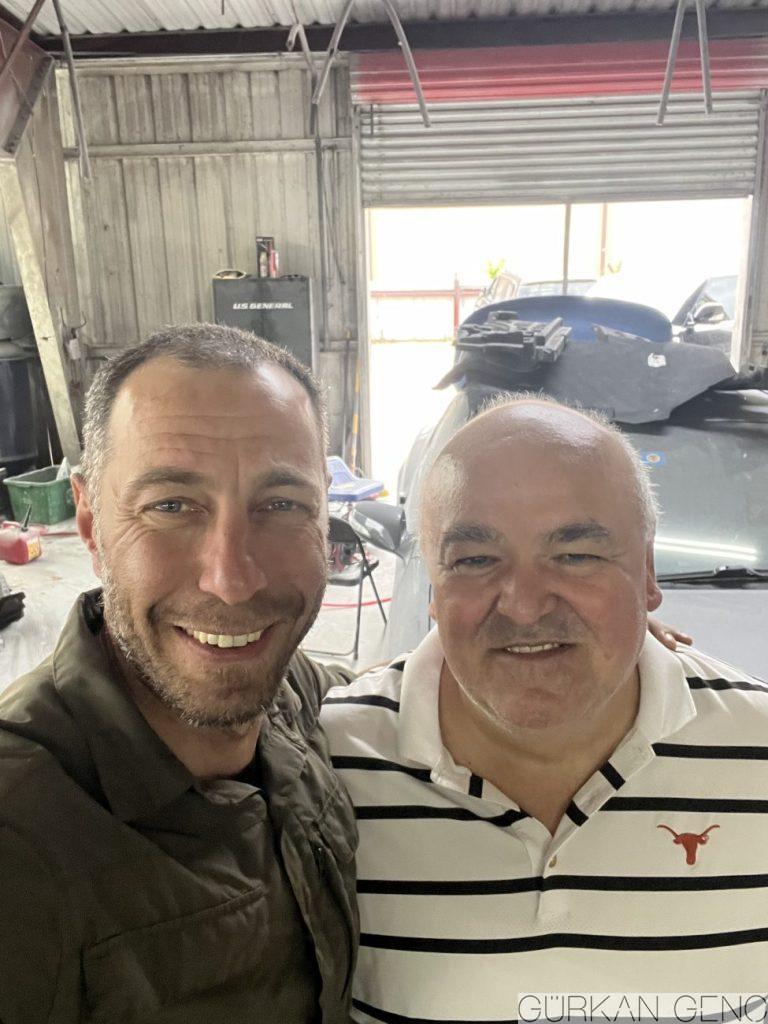
I didn’t know he had been following my trip through the United States. In fact, for the last three months, whenever I had coffee somewhere in the U.S., he supported me.
Mehmet hosted me at his house in Dallas. We watched all the matches together except one. On the last match day, our Ambassador Sedat Önal from Washington DC, and Consul Ahmet joined us. The last game was played against the United States. In the previous three games, only two players from our team, Vargas and Captain Eda, came out to meet the audience after winning. This is a huge country, and Turkish people from all across the US took the time to come and watch.
At least, it would have been more elegant if the whole team had done something for the Turkish supporters, even if they were tired. Okay, maybe you’re tired or whatever, but after the last match, the team left the stadium without interacting with the audience. Even when the American team was on the field, our team left right away, which was quite strange. They didn’t even take photos with the Ambassador or Consul.
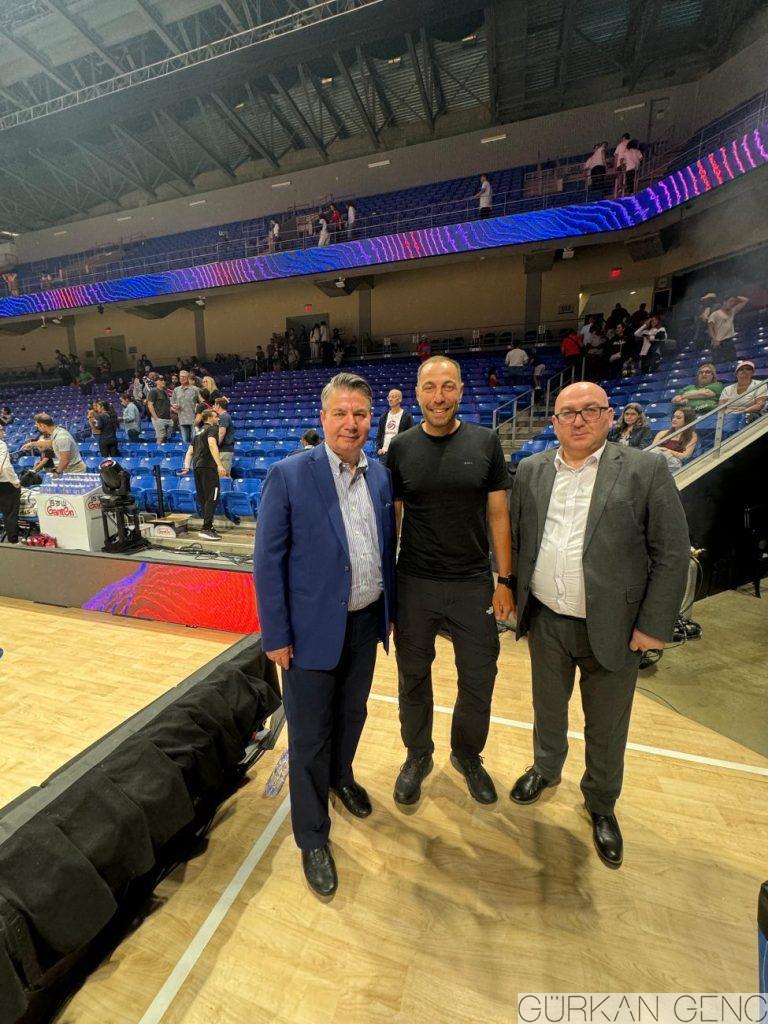
A volleyball team official came and apologized, saying they had gone to the locker room and would be leaving the stadium shortly. I witnessed this situation. It was the Volleyball Federation’s mistake, not Turkish Airlines’. Many people couldn’t even perceive this. Our Ambassador came all the way from Washington DC to watch the match and joined the crowd, and he can’t even take a photo with the team? When I share this event with others, they deny it, saying it didn’t happen. But I share my experience. If you didn’t experience it, don’t belittle those who did. Anyway, one day, Gürkan Genç will be the Minister of Sports… And when that day comes, things will change radically, I promise.
May the path of our women’s volleyball team always be open.
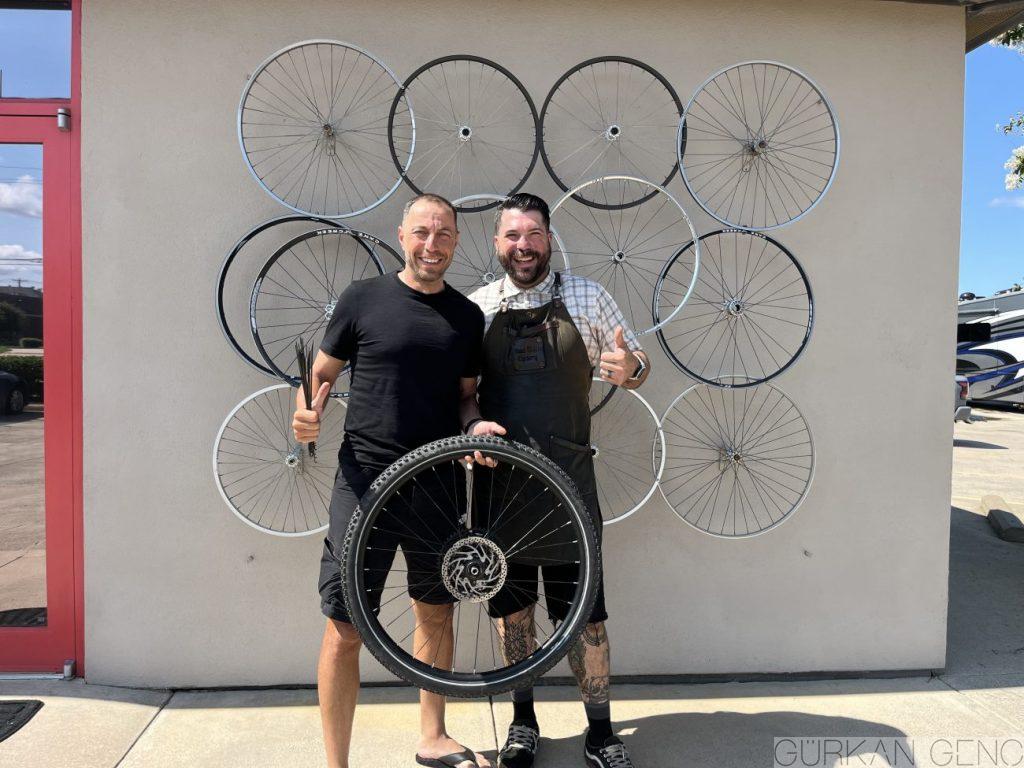
Thanks to Mehmet, I had the chance to explore Dallas. In addition, I solved the spoke issue of my bike there. While continuing with the same spokes, I slightly enlarged the ends. There was also an issue with the luggage. I mentioned this in my previous post. I carefully measured the luggage again with a precise meter, sent it to Mutlu in Turkey, and later with Ramazan, they redesigned the luggage from scratch to fit this bike frame. I’ll pick up this new luggage in Houston.
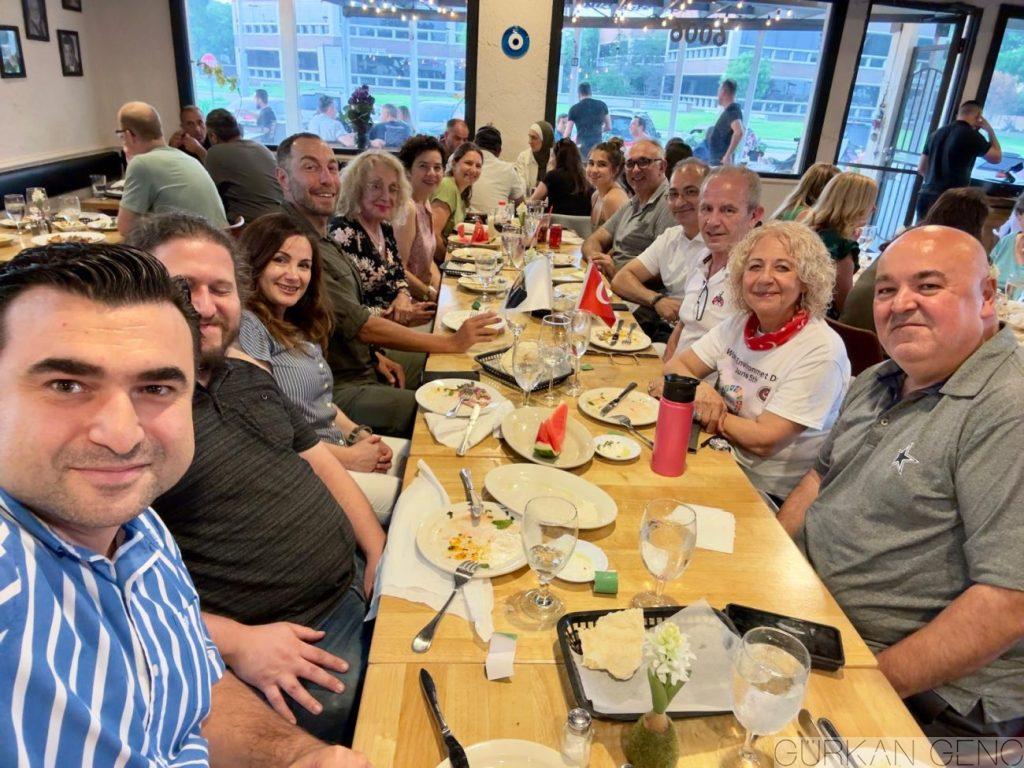
I also had the pleasure of meeting the ATA group in Dallas, where we had a great meal together. The group president, Erdal Sipahi, gifted me a Turkish flag. This flag will travel with me through the U.S. states and eventually be delivered to the Ambassador in Washington DC. That will be a beautiful memory. Thanks to Mehmet’s gesture, my route was shortened. I could have gone straight to Houston without stopping in Dallas, but before that, there was a city I was very curious about, New Orleans.
Exactly one week later, Mehmet Oral dropped me back at the starting point. On the way back, I replaced my broken GoPro10 camera with an Insta360 AcePro camera. Over the years, I have replaced outdated or broken devices with new ones in the United States.
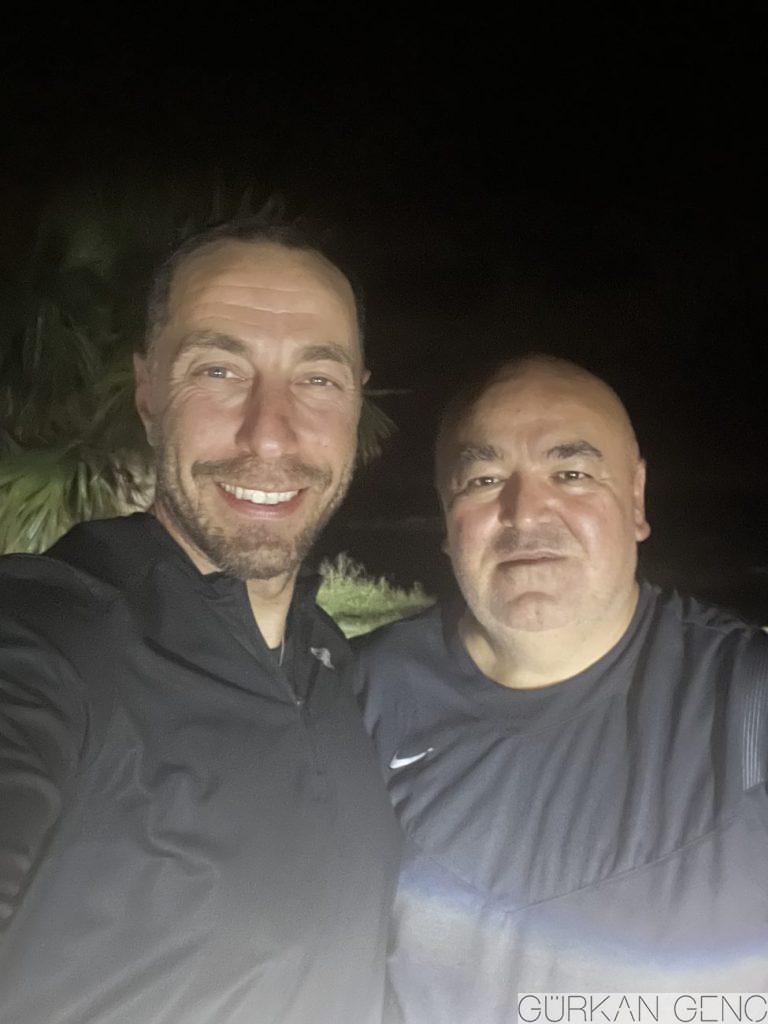
In the end, Mehmet and I arrived back at the point where he had picked me up.
– Gürkan, if you want, we can stay in a hotel or sleep in the car. I don’t feel right leaving you here.
– Mehmet, this is my normal routine. It’s something I experience every day. If the weather is still light, drop me off, drive a little more, and I’ll set up my camp here to finish the day. Tomorrow, I’ll continue my journey to New Orleans.
– Alright then. You always have a home and a brother in Dallas.
We hugged and said goodbye. After 10 intense and bustling days, I was back on the road.
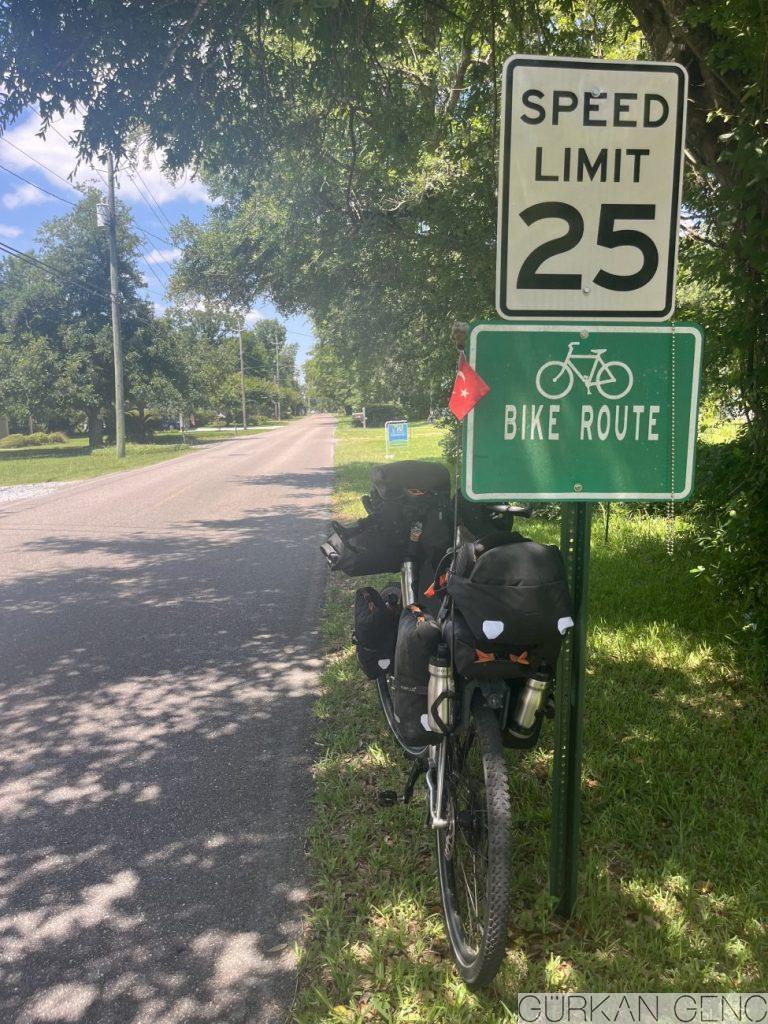
New Orleans wasn’t far; I’d reach it in two days. The road was quite beautiful, too. There’s a road in the area that has been closed to vehicle traffic for a long time. When I asked Google or Komoot for directions, they gave me a ridiculous route that was twice as long. However, from satellite images, I could see that I could pass through that closed road. I decided to take my chances, and I learned that the road was only open to pedestrians and cyclists.
It wasn’t a short distance either. The road led to White Kitchen, Fort Pike, and Venetian Isles (I’m writing such details because foreign cycle tourists also read these posts). It was truly an epic road. Although I didn’t see any, crocodiles are often spotted along this road. Maybe I missed them because they were camouflaged, but near the end of the road, there was a large swamp where crocodiles live in their natural habitat.
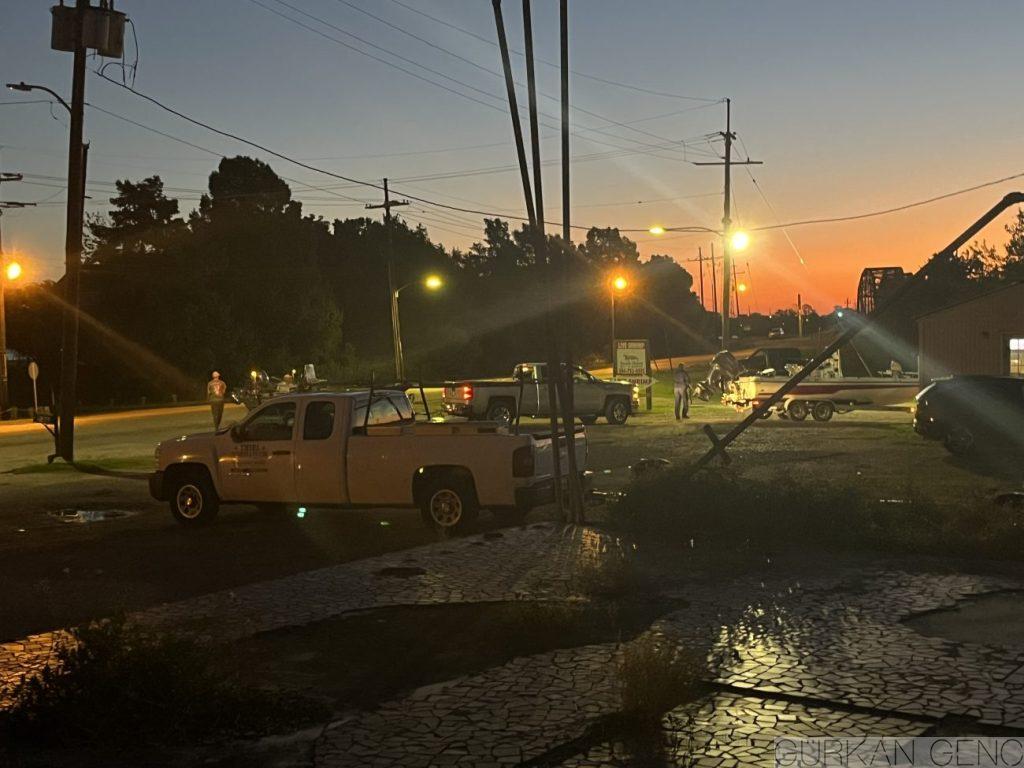
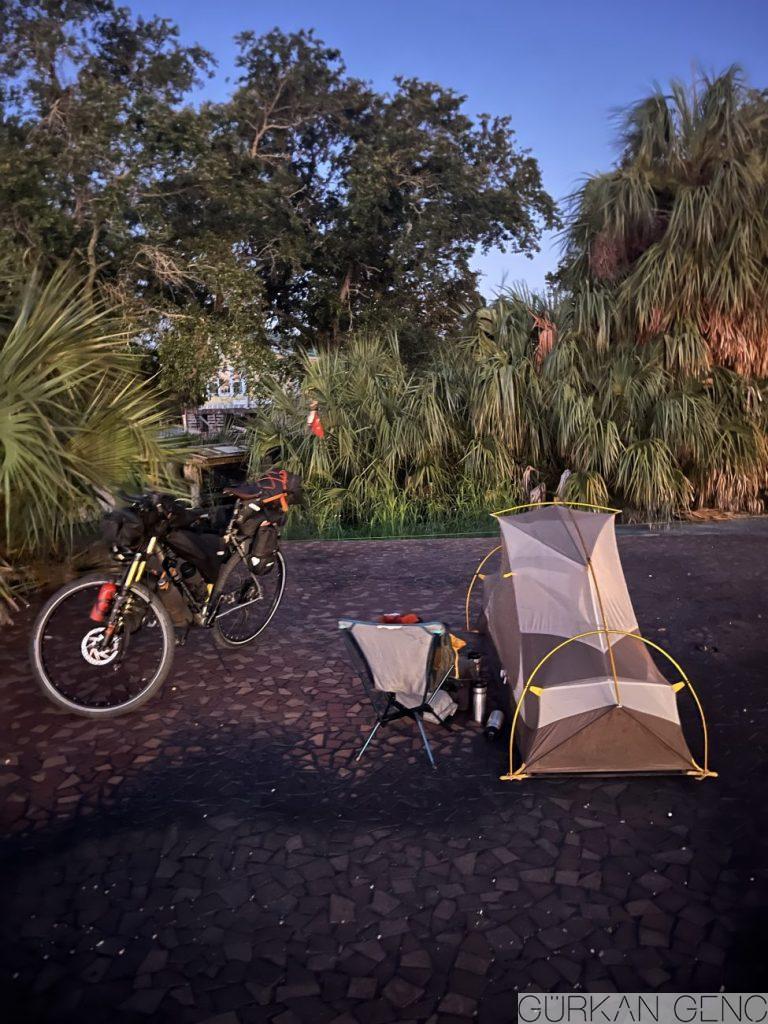
That night, during my camp in Venetian Isles, I learned something valuable. It was a small, quiet village. I set up my tent right next to the area where boats were being launched into the river. At 4:30 AM, people from New Orleans started arriving in pickup trucks with their boats, bringing incredible activity and noise. For three hours straight, boats continued to be launched into the river. I learned the hard way not to camp near boat-launching areas again.
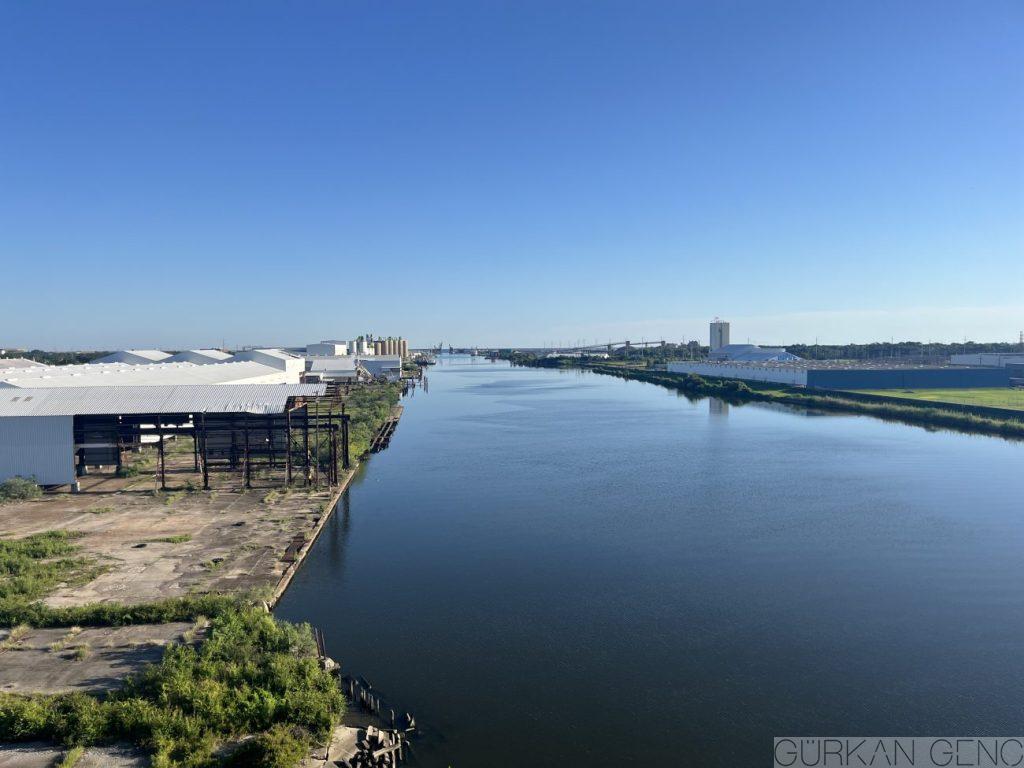
Zeynep from Miami had arranged for me to stay at Seher and Habip’s house in New Orleans. I didn’t know them, but Zeynep had told them, “My brother, my dear, is coming to stay with you.” Before entering the city, I did some research and found a place called “Fatma’s Cozy Kitchen,” which was very close to Seher and Habip’s house. Since I would arrive early, I decided to stop there for a bite to eat.
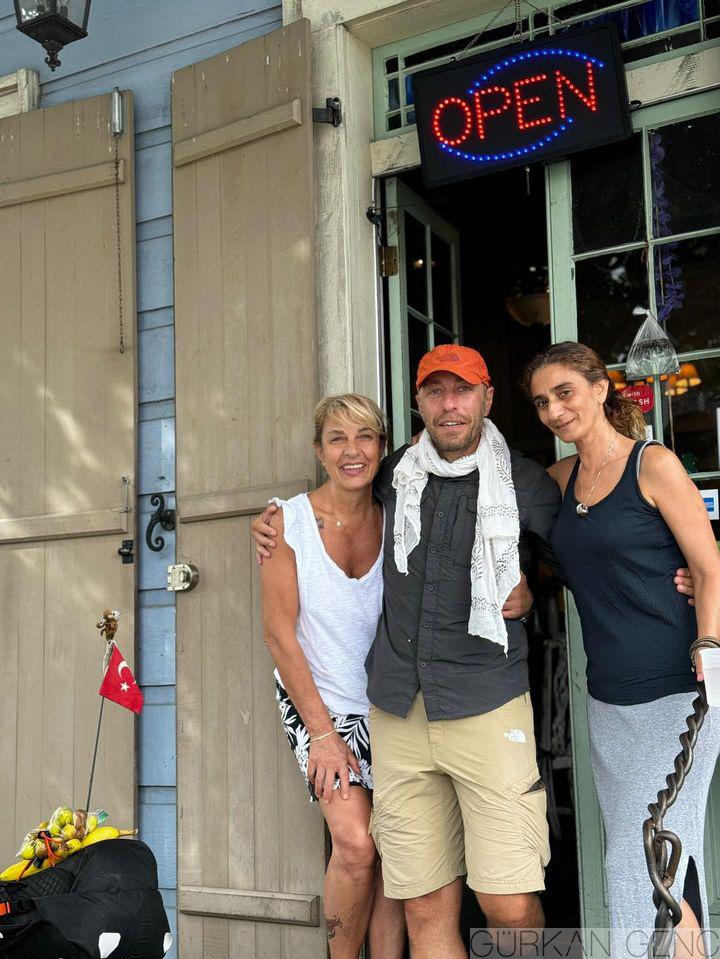
When I pulled my bike in front of the place, Fatma noticed me from inside. We didn’t know each other. “Oh, another homeless person has arrived at the door,” she thought. No joke, she did think I was homeless at first. I recognized they were Turkish, and after saying “Hello,” the conversation flowed naturally.
Fatma and Sona greeted me so warmly. When they asked where I was staying, I mentioned Seher and Habip, and they smiled, as they were very close friends. Fatma, who had been like the mayor of the hood for years, had some sad news that day. Seher’s father had passed away in Turkey. I couldn’t believe it. It was almost as if I had arrived at the exact right moment. I had also lost my father while being far away, so I truly understood how difficult the situation was. I even told them, “I don’t want to disturb you,” and called Zeynep to explain what had happened.
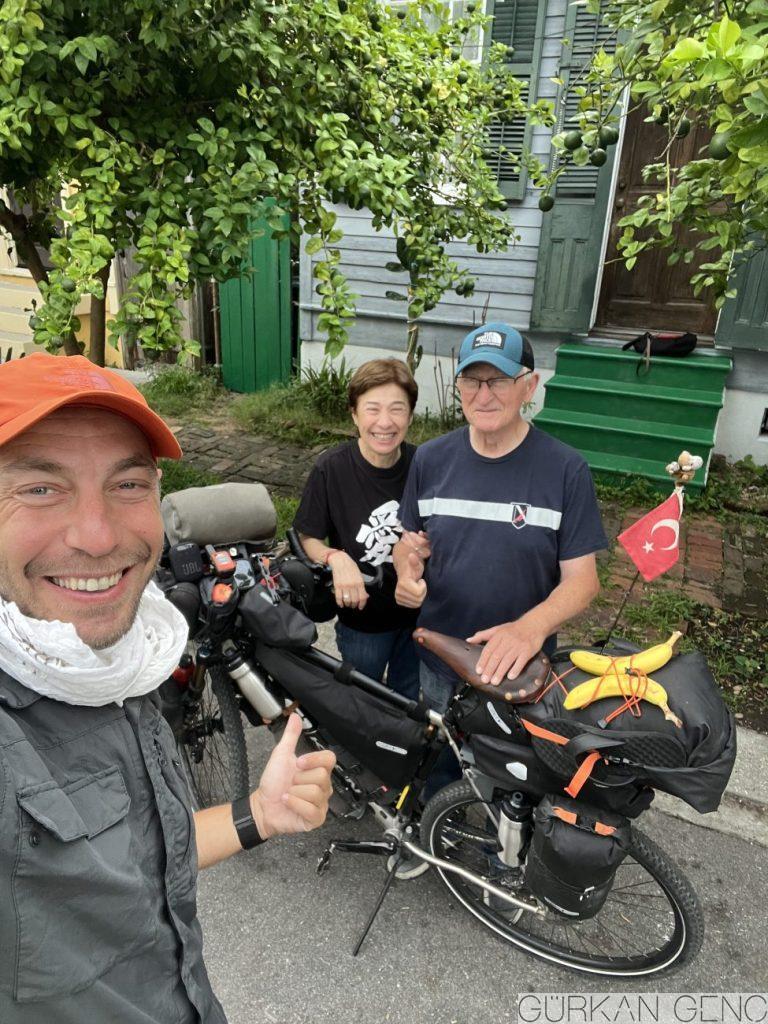
Zeynep told, “Gürkan, maybe it was meant for you to be there today. Being with them will be very good for them. I believe that. Spend time with them. They’ll love you so much, and you’re exactly where you need to be, stay there.”
I spent about 10 days with this wonderful family and their friends. Every morning at 6 AM, we would walk across the street to our little coffee shop, enjoy our coffee, and then everyone would go about their day. I focused on writing my posts and editing my videos. In the evenings, I would meet Seher and Habip to go to a jazz bar, and we’d cook dinner at home before going out. I became so used to this routine that I never wanted to leave. Even after I left New Orleans, Habip continued to call me regularly for days. But after realizing my journey was still long, he stopped calling, as saying goodbye to someone you care about is always hard. Every conversation, every chat, was bittersweet. I didn’t know when I’d return or if I’d even return to their place again.
Listening to Seher and Habip’s stories and life adventures was truly beautiful. Like all of us, they had their ups and downs in their journey through life.
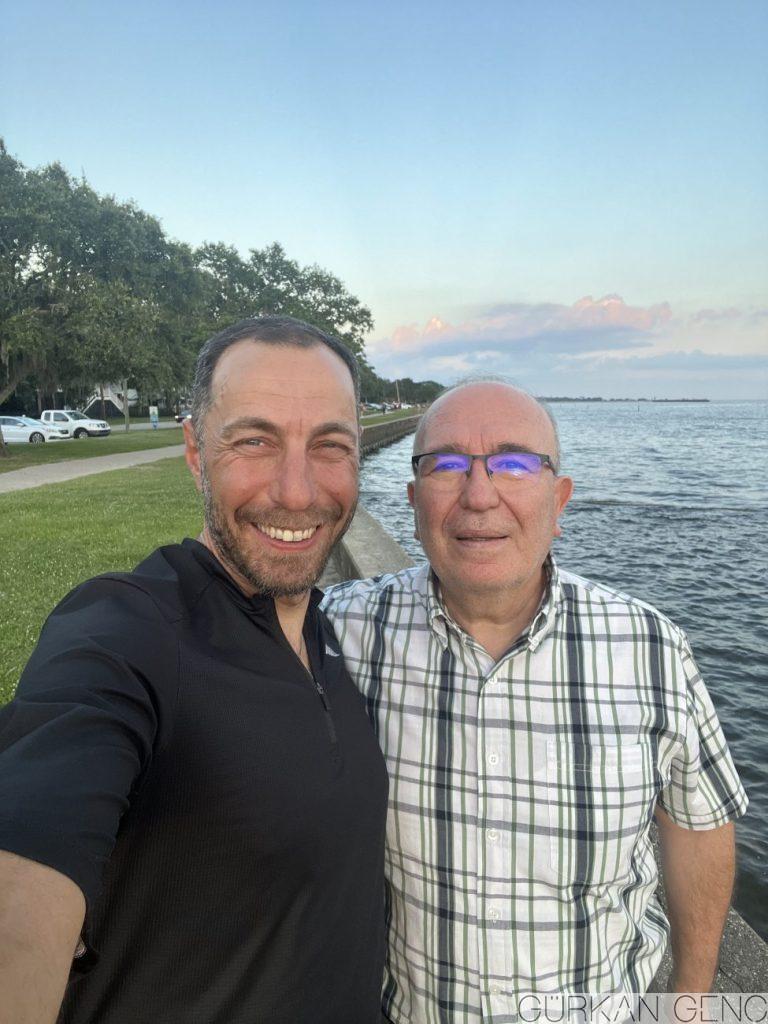
On the second day, they introduced me to Dr. Colonel Bahri, who, I believe, was the only person who could give me a detailed, organized tour of New Orleans. He showed me every place to visit and avoid in just one full day. We also went out to listen to jazz a few evenings. His daughter Damla had a medical exam, and although she couldn’t hang out with us much because of the stress, she did cook a wonderful meal for us one evening. His wife, Ayfer, and son, Ege, were in Turkey on vacation, so I didn’t meet them. Every day, I met with Bahri to explore the city, and it was a great experience. Listening to Bahri’s life story was also very enjoyable. With his military background and being a doctor, he was observing me just as I was observing him.
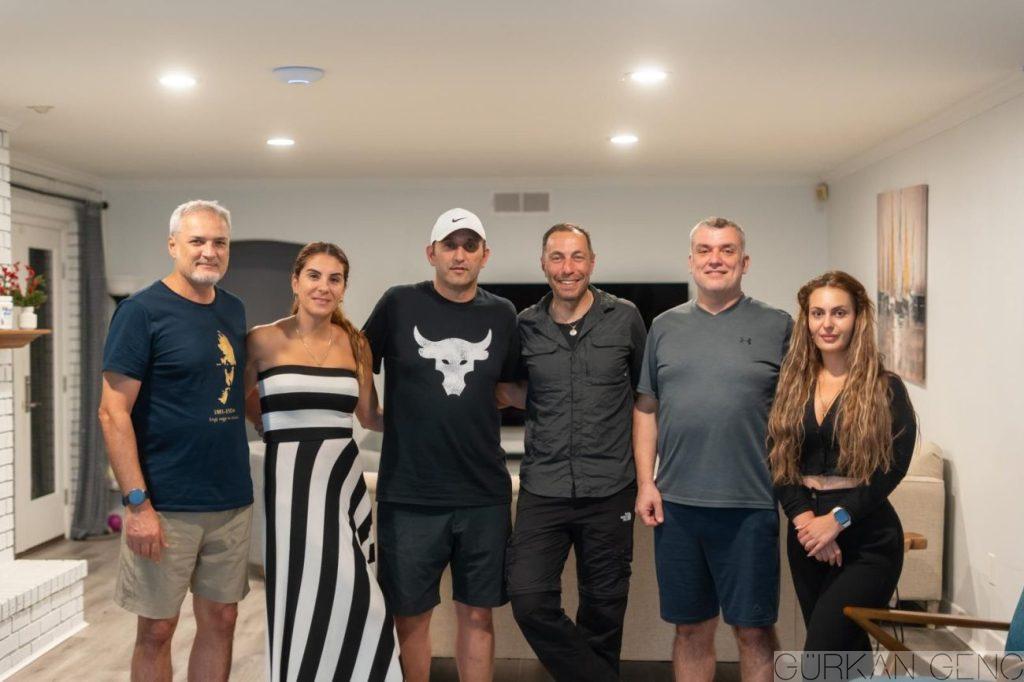
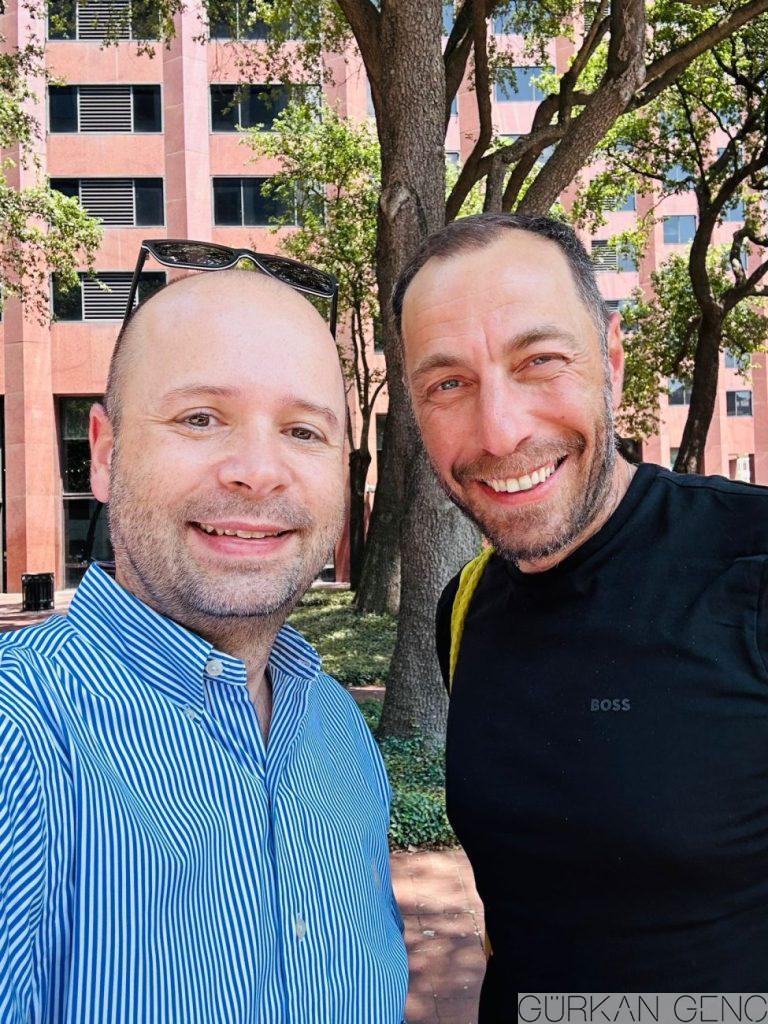
In New Orleans, I also met with former national volleyball player Senem, world record-holder in high jumping Ruhan, and one of our national athletes Mesut. We had dinner together and discussed the Turkish sports community. We shared experiences about what was good and bad in their time. I also met with Asir, who had been following my travels for years, for lunch and had a great conversation. Additionally, I met many new people. When I left, I set off for Texas on a rainy day, continuing my journey after saying goodbye at Fatma’s shop.
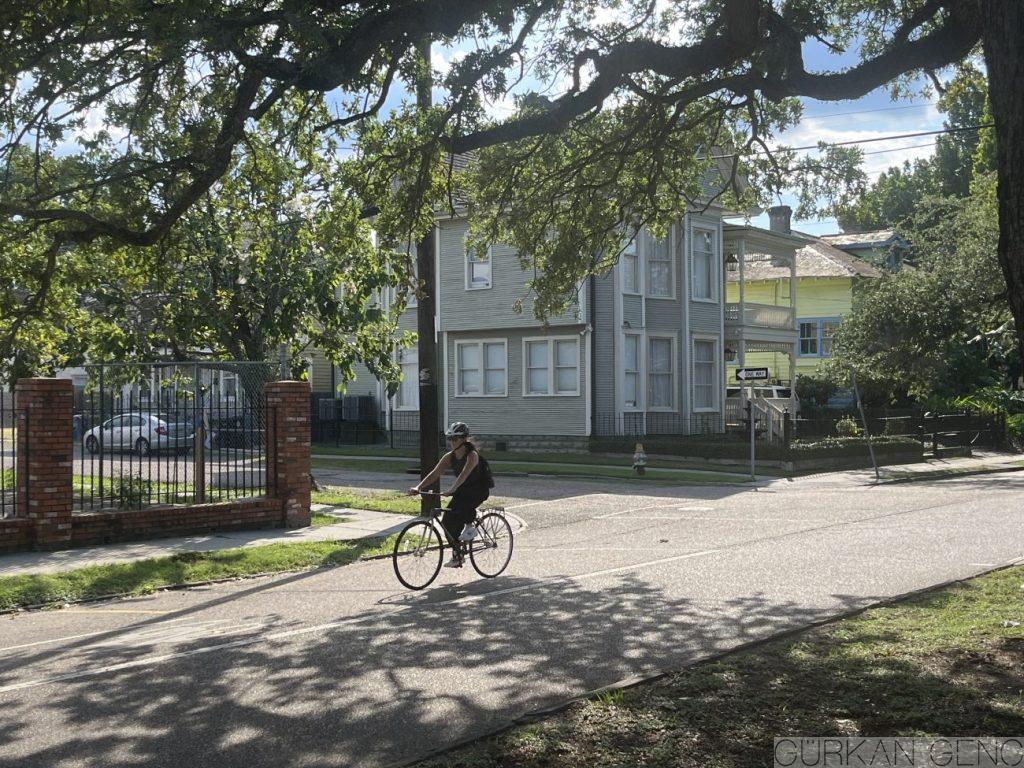
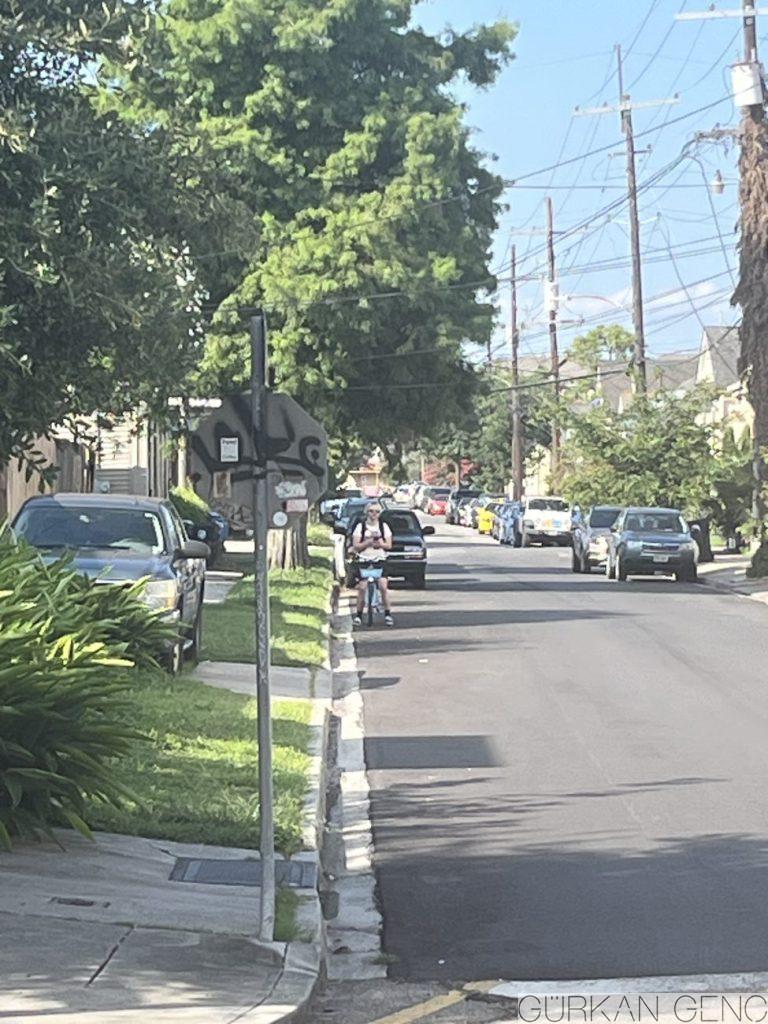
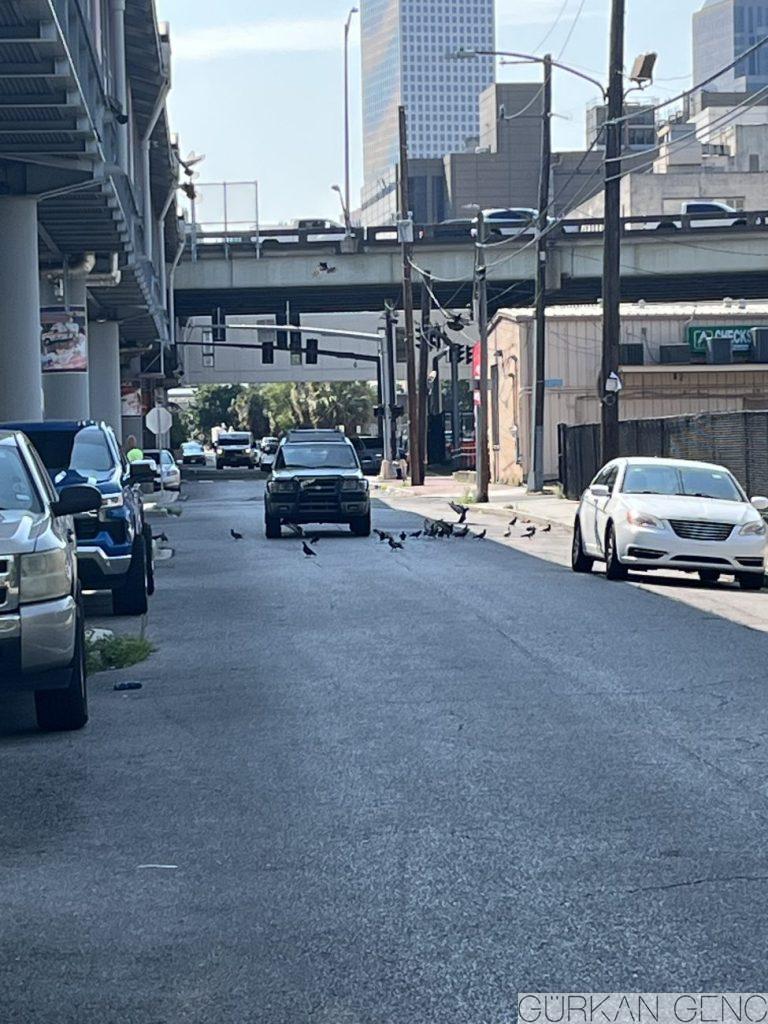
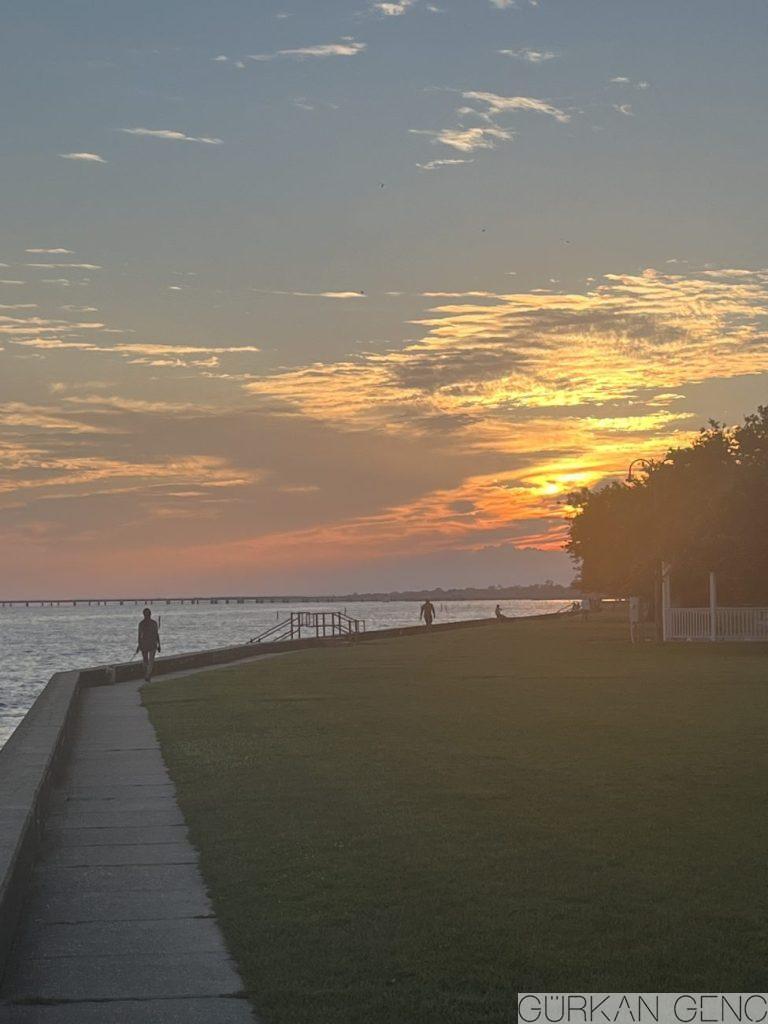
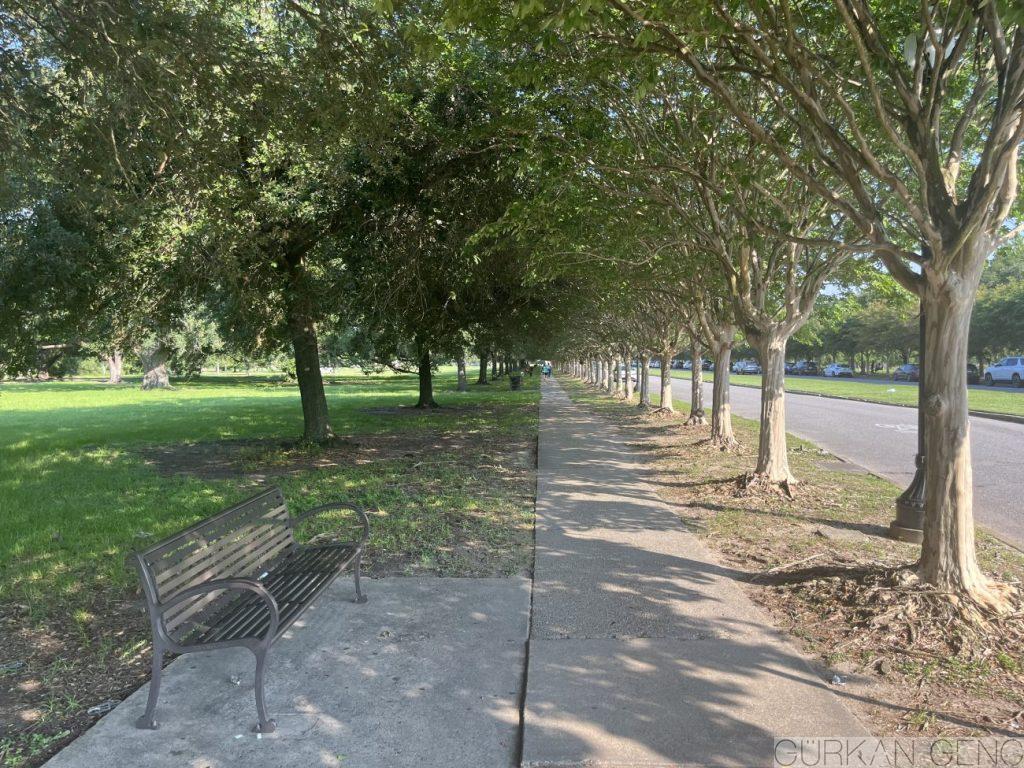
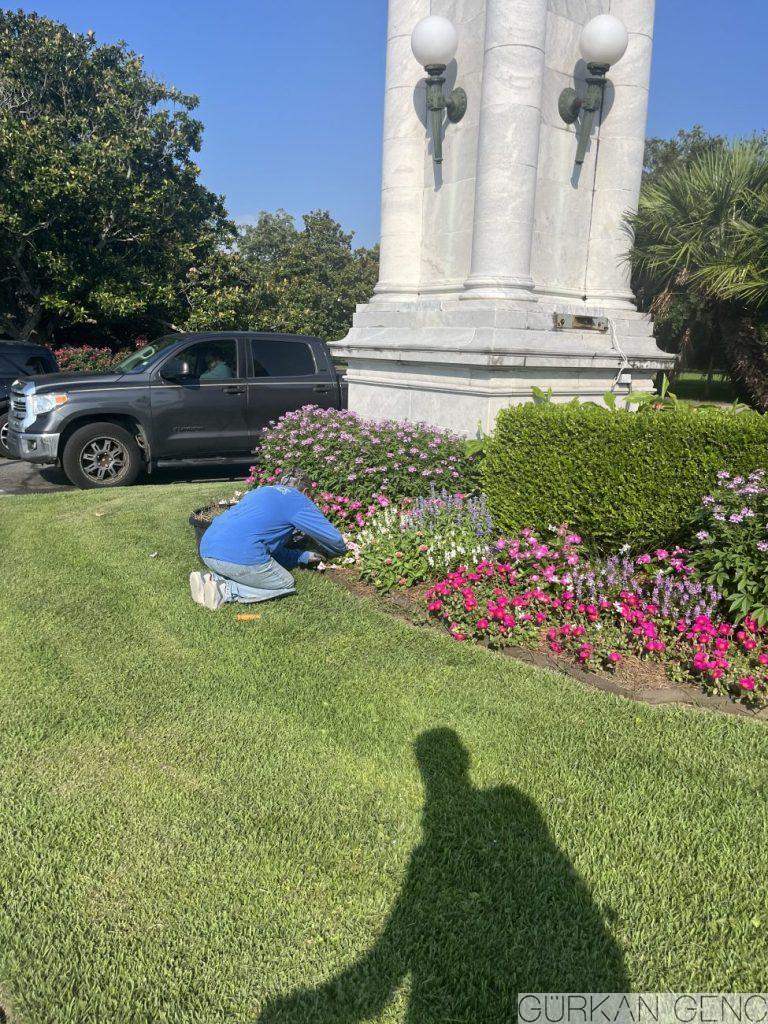
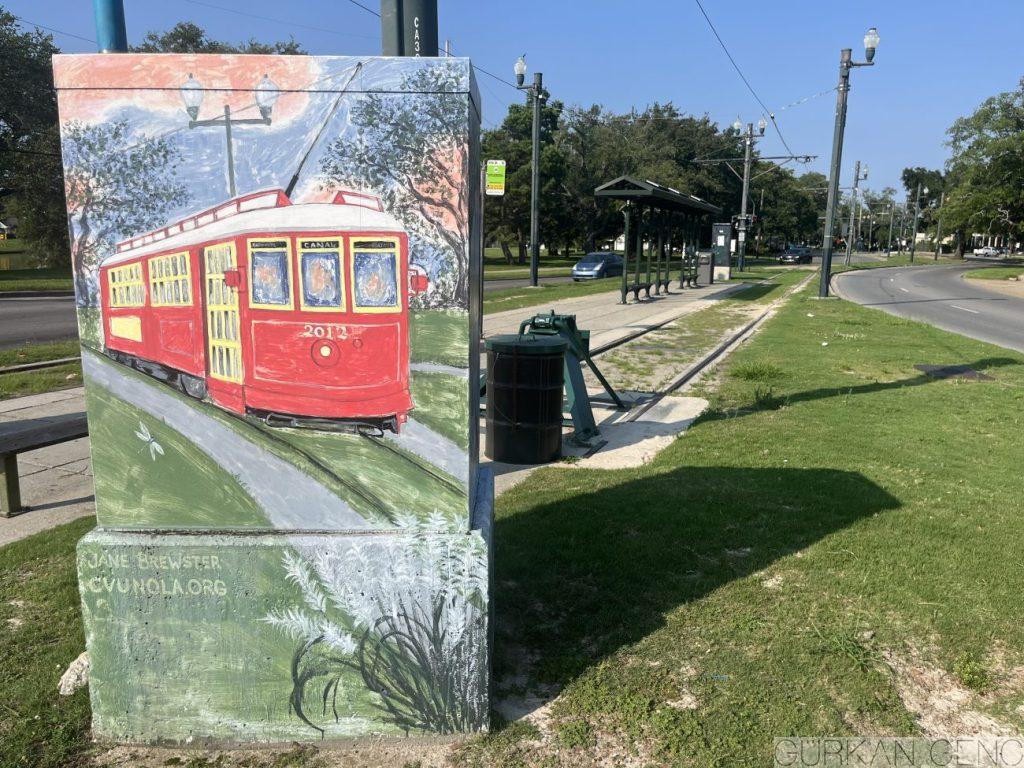
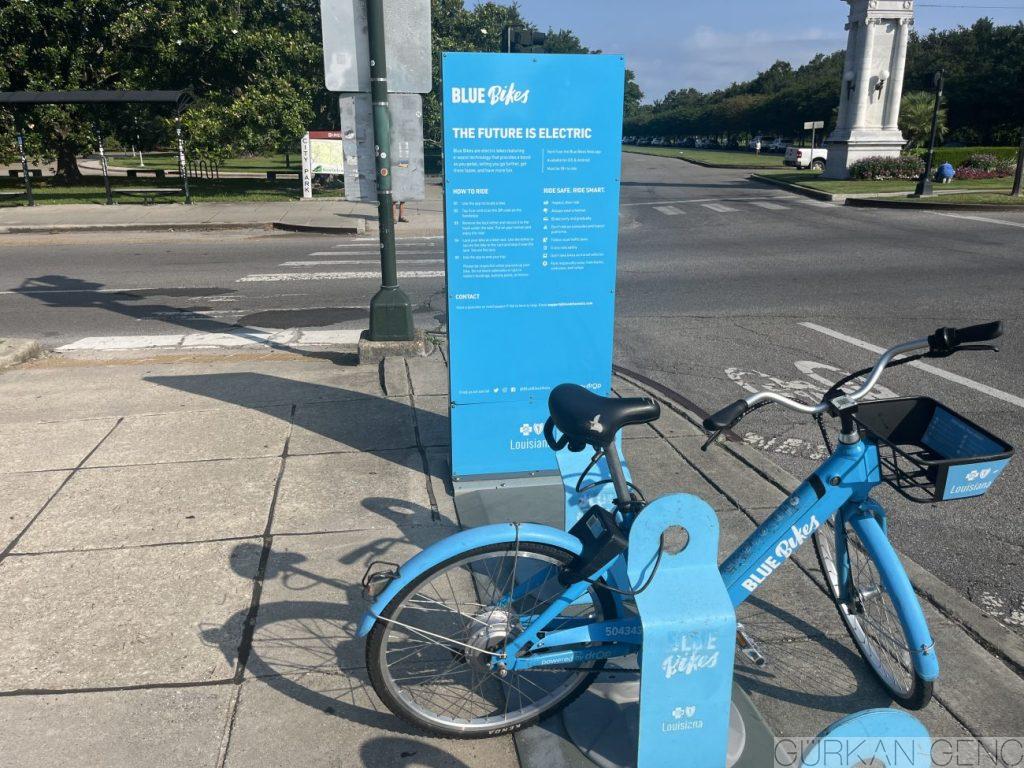
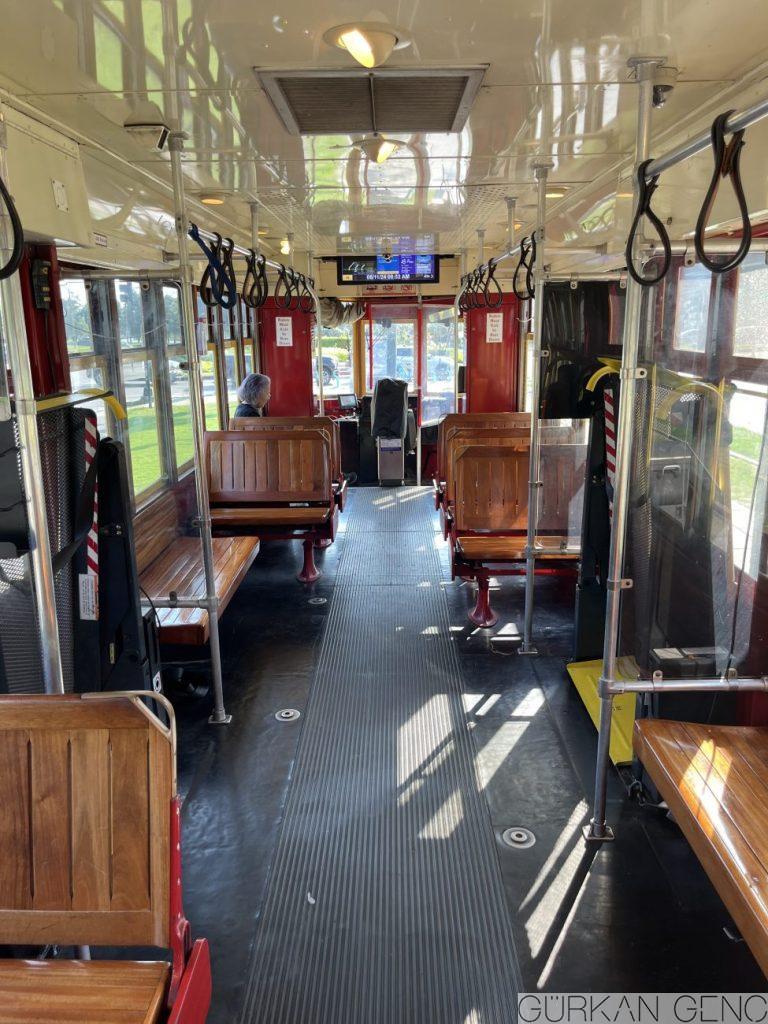
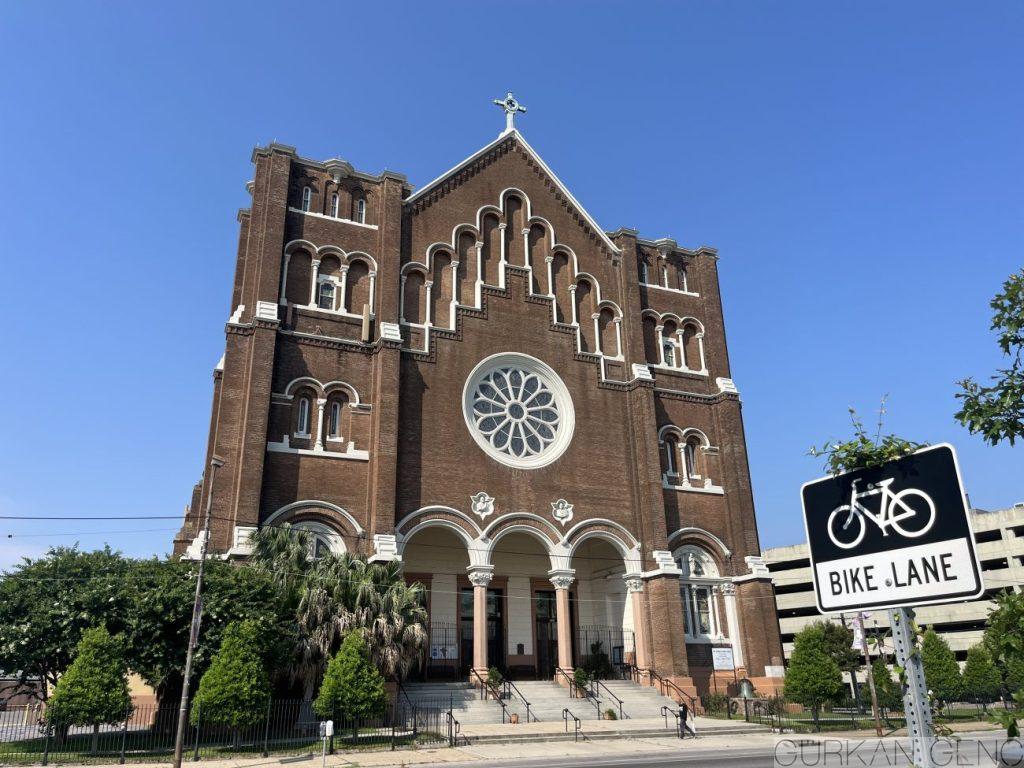
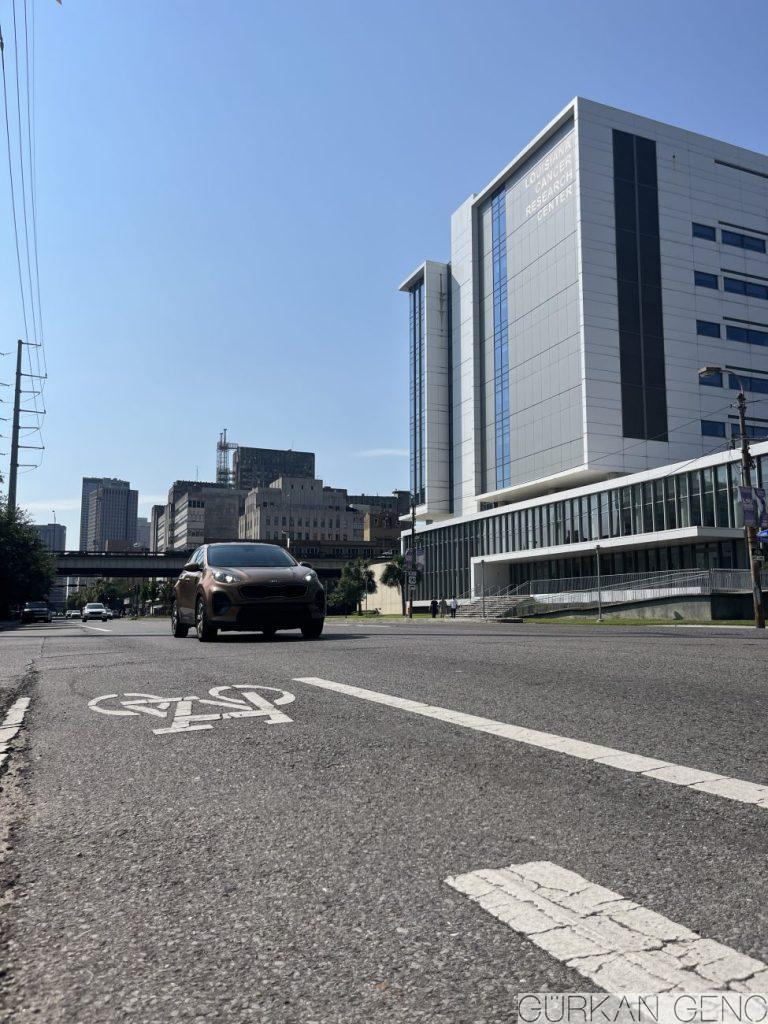
New Orleans is unlike any other city in the United States. When people talk about the paradise of jazz bars in the world, one of the top destinations is here. While I’m not a huge jazz fan, I do enjoy listening to it, and this city has a distinct character compared to others. The downtown area appeals to the liberal side of the country, but the surrounding villages are more conservative, or even Republican. It’s not a city known for its low crime rate, there are times when people are too scared to go outside, and shootings occur. Despite this, walking through the streets during the day is quite pleasant. Except for the city center, I was often alone on the streets, which didn’t bother me, but for an average American who does everything in a car, it would be a scary experience. They don’t feel safe.
The issue of individual gun ownership is quite prevalent throughout the southern states, and this creates a security situation in the United States that bothers me. It doesn’t matter whether there are police or laws; what disturbs me is how easily every citizen can carry a gun. Because of this, New Orleans feels more dangerous to me than Cucuta, located at the Colombia-Venezuela border. I’m serious.
New Orleans also has its version of monumental graves, similar to those in Buenos Aires, Argentina. The graves are built this way due to the frequent flooding in the area. If the graves aren’t in a monument cemetery, the rising water level erodes the soil, exposing the bones of the bodies. This happened during the infamous Hurricane Katrina.
During my world bike tour, I visited WWII museums in Japan, Russia, and Germany. In New Orleans, I also visited the second-best WWII museum in the United States. The museum was well-designed, and offered a form of self-criticism within the context of the American involvement in the war, showing visitors the political mistakes America made during that time.
I loved this city, and I’ll definitely return someday. 🙂